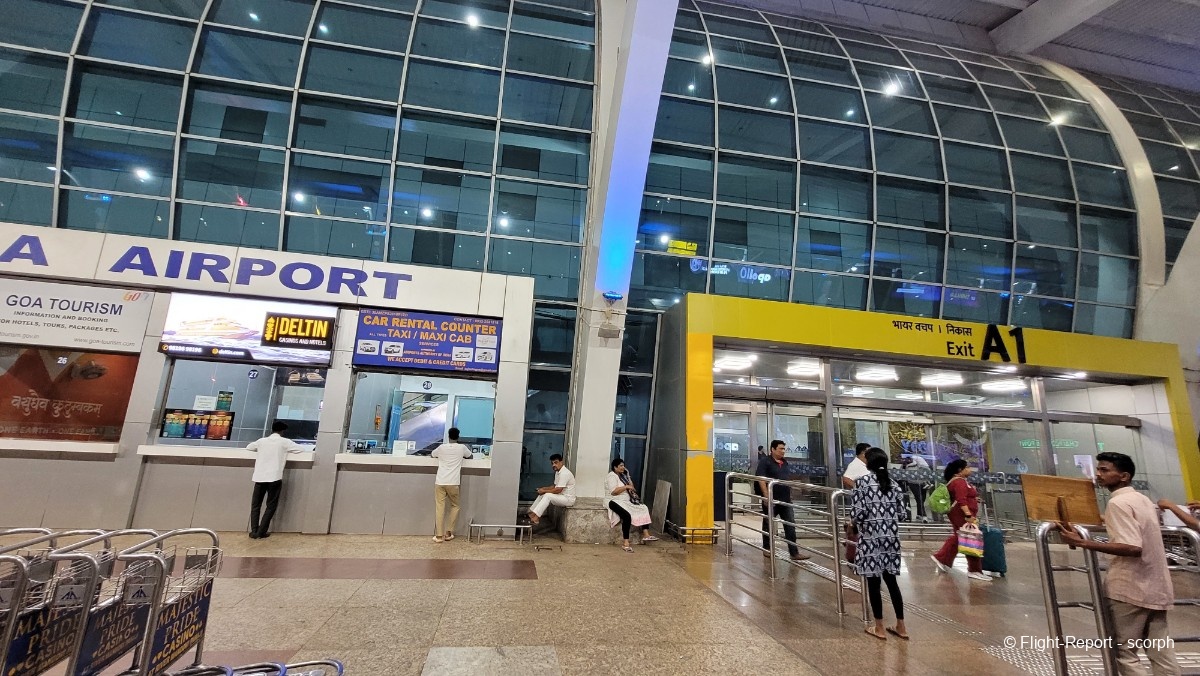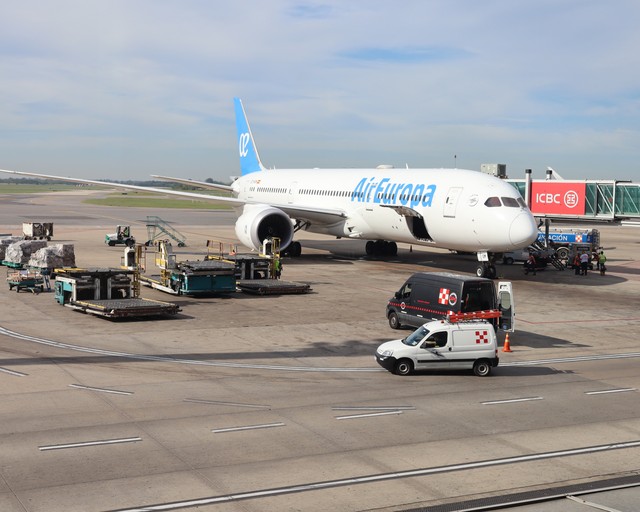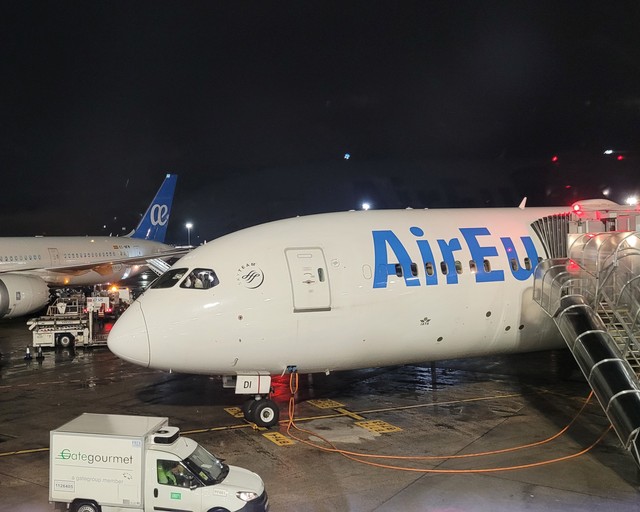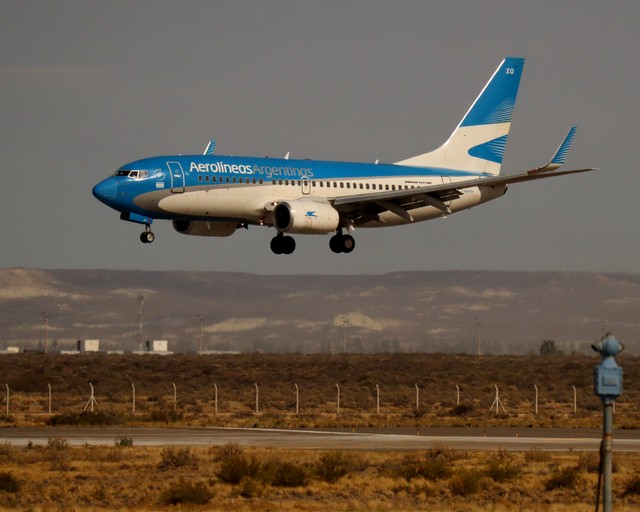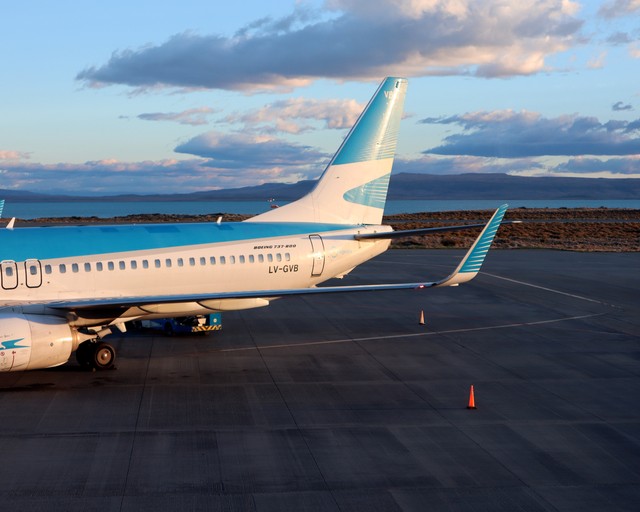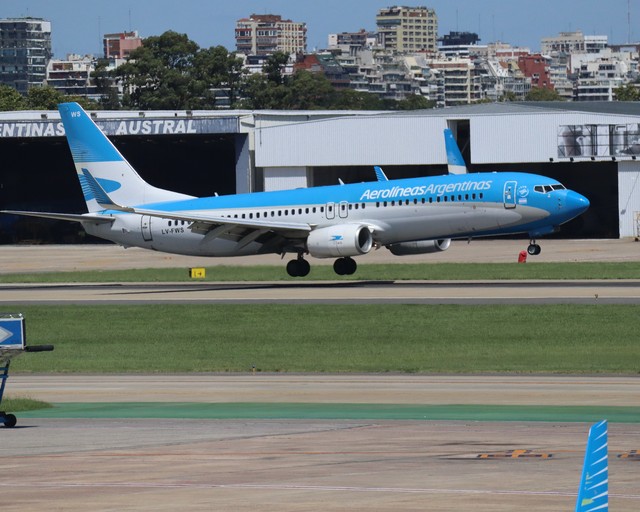Last weekend planned during my 2023 travel in India, and it will be heading to the small coastal state of Goa.
Introduction
Three weeks before the flight, my French colleague and I decide to take a break for a weekend and go visit the beaches of the small coastal state of Goa.
If you're not familiar with Goa, it's like the Indian Côte d’Azur. This former Portuguese colony has, in recent years, become the place to be for holidays, especially for India’s middle class. It also attracts many foreigner both Westerners (thanks to its numerous and famous Ayurvedic institutes) and, more recently, Russians.
Unsurprisingly, there are plenty of flight options after all, this small Indian state actually has two airports! The original one, Goa Dabolim, is near Panaji (the state capital and main city). However, since this airport is shared with the Indian Navy, it quickly became saturated both in terms of terminals and its single runway and can't be expanded due to is location. As a result, a brand-new airport was built in the north of the state: Manohar International Airport. Interestingly, both airports now receive long-haul flights.
In our case, we’re looking for an evening flight and we’re aiming for the "old" Dabolim Airport since our accommodation is located in the southern part of the state, no need to add an extra hour of nighttime driving.
We opt for Vistara, which had just launched this route at the end of 2023 and offered both the best schedule and the best fare.
For the return flight, we choose the rather low-profile airline Alliance Air, formerly Air India’s regional feeder service. Interestingly, it wasn’t included in the Tata Group’s acquisition of Air India. Again, the schedule/fare combo was the most favorable.
Which gives us the following routing:
Flight routing
- 1UK583 - Economique - Bangalore => Goa Dabolim - Airbus A320neo
- 29I548 - Economique - Goa Dabolim => Bangalore - ATR 72-600
We can definitely say the flight offering between the capital of Karnataka (Bangalore) and the state of Goa was at the time of this flight quite rich and diverse.
In fact, just on the BLR-GOI (Dabolim) route alone, no fewer than four carriers was sharing the market: the usual IndiGo and Air India Express, offering 3 and 2 daily flights respectively. Then there's Vistara, which operates up to 3 daily flights (it was only 2 in december 2023), and finally the small Alliance Air with its ATR turboprops, running 4 flights per week.
If you also count the flights to the new Manohar International Airport, there are no fewer than 5 daily flights operated by IndiGo and 2 daily flights by the low-cost Akasa Air.
Now things have drasticly changed with Indigo operating up to 7 daily flight to GOI and Air India express down to a single daily. Alliance Air is still operting an almost daily flight using an ATR72.
For Manohar Indigo frequency has reduce while Air India express as increased. A new player as joined the game Star Air using a rare Erj-145 and another one as leave the game (Akasa Air).
Unsurprisingly, as is often the case in India, this route will be an exclusive for the Flight Report database, and the now gone Vistara flights on this route are also not very commonly reported.
Evening departure from BLR T2.
So it’s on Friday evening after work that my colleague and we head to the airport by Uber. As usual, the ride is long and tiring, made worse by evening traffic jams, which add around twenty extra minutes to the journey. All in all, we arrive at Terminal 2 after over 1 hour and 45 minutes on the road.
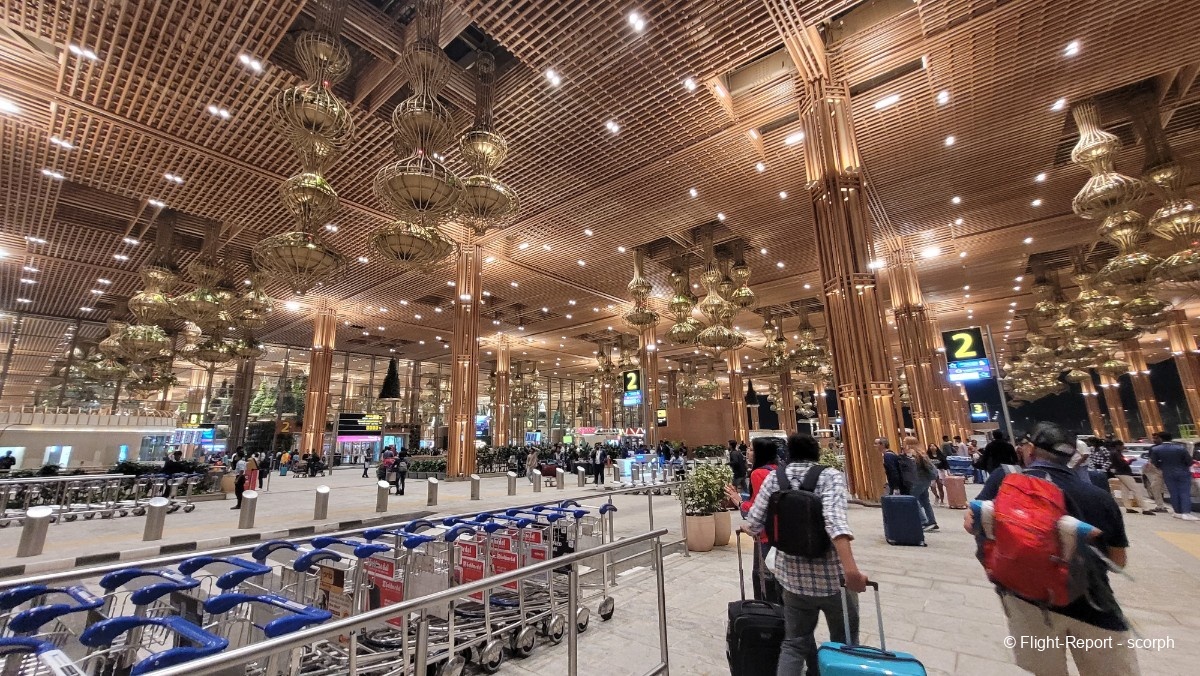
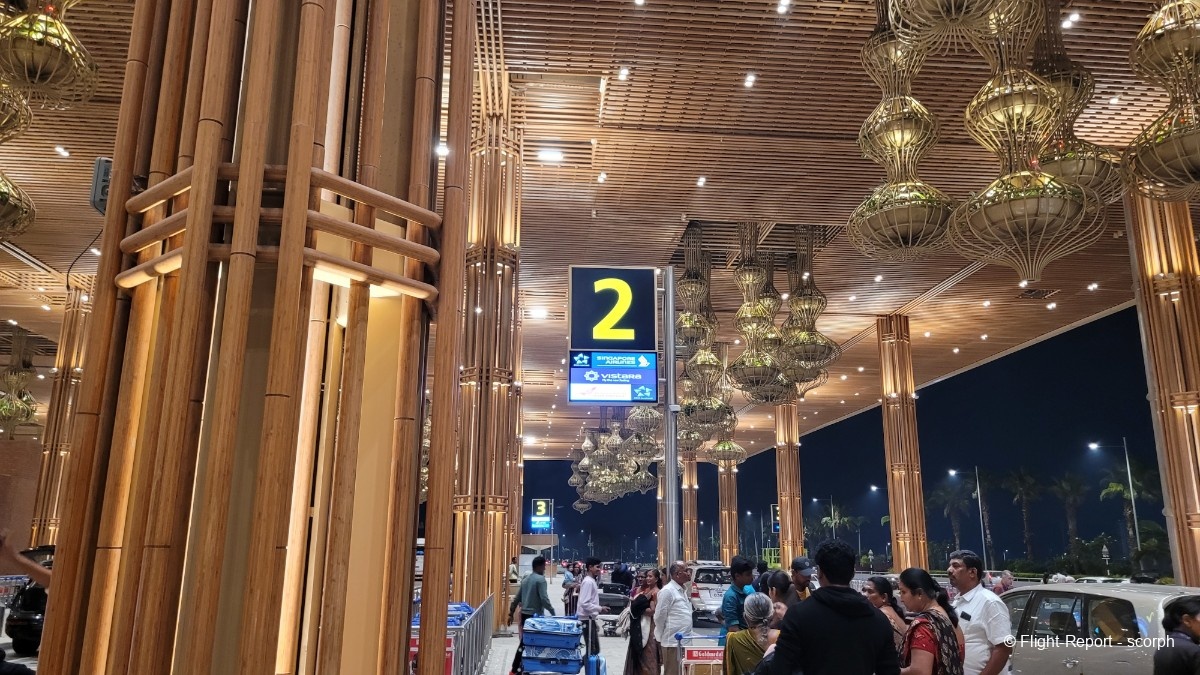
We’re still outside the terminal when we come across the self check-in kiosks. Since we’re not checking any luggage for this short weekend trip, all we need are our boarding passes, which we quickly get using one of these self check-in machine.
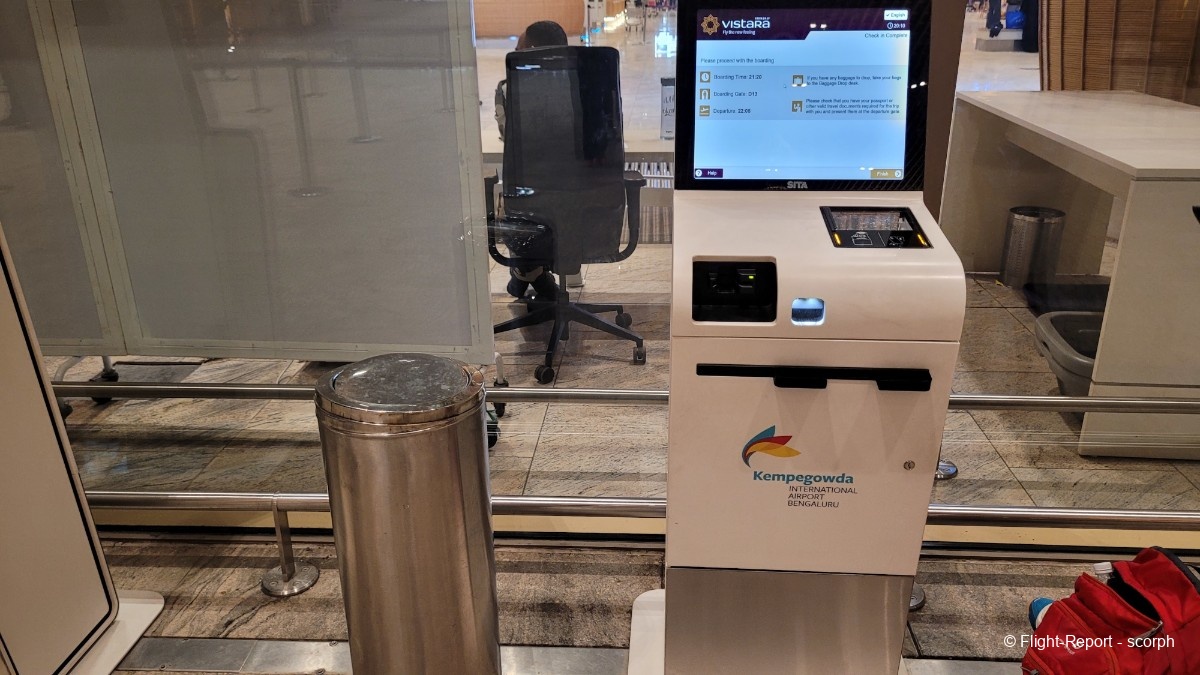
After a ticket and ID check, the security guard at the entrance lets us into the groundside area of the terminal. Terminal 2 opened just a few weeks ago, and the least we can say is that, architecturally, it’s a real success. The decor is refined, and the terminal is genuinely user-friendly.
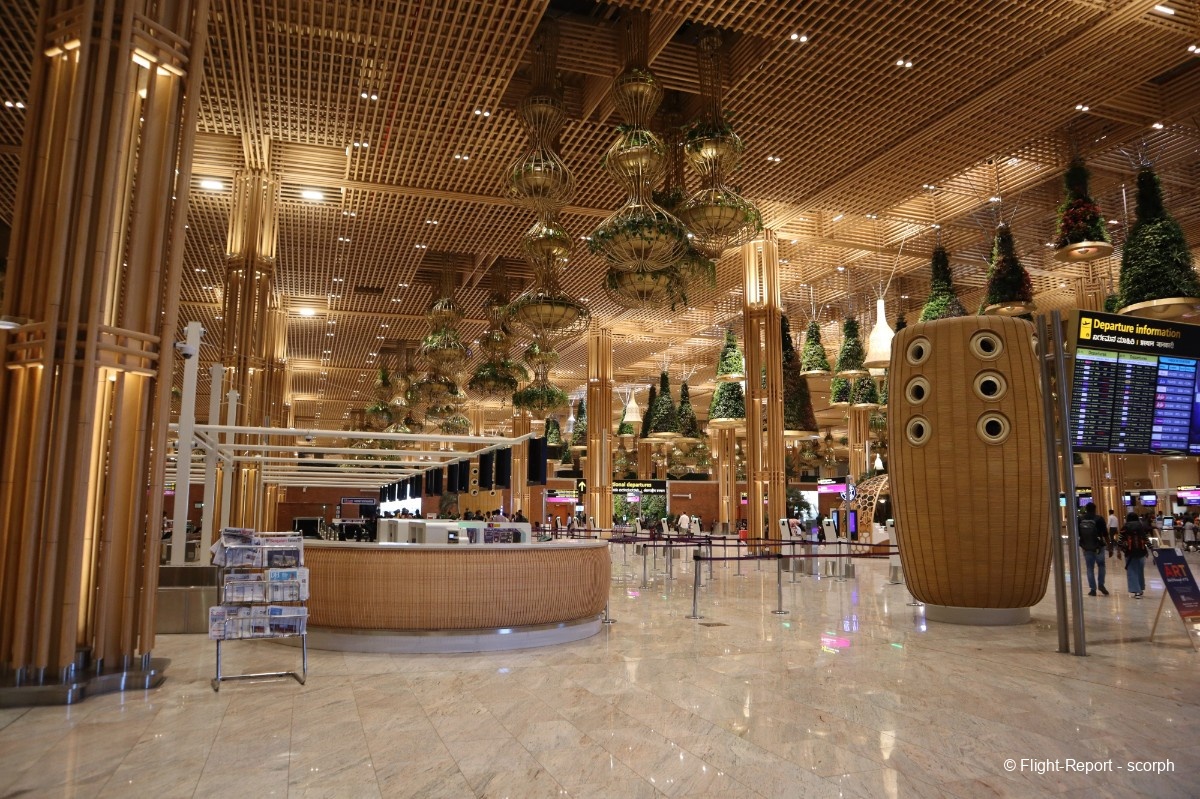
The departure board of Terminal 2, which hosts all international flights as well as a large portion of the domestic traffic from airlines like Vistara, Air India, Air India Express, and Star Air.
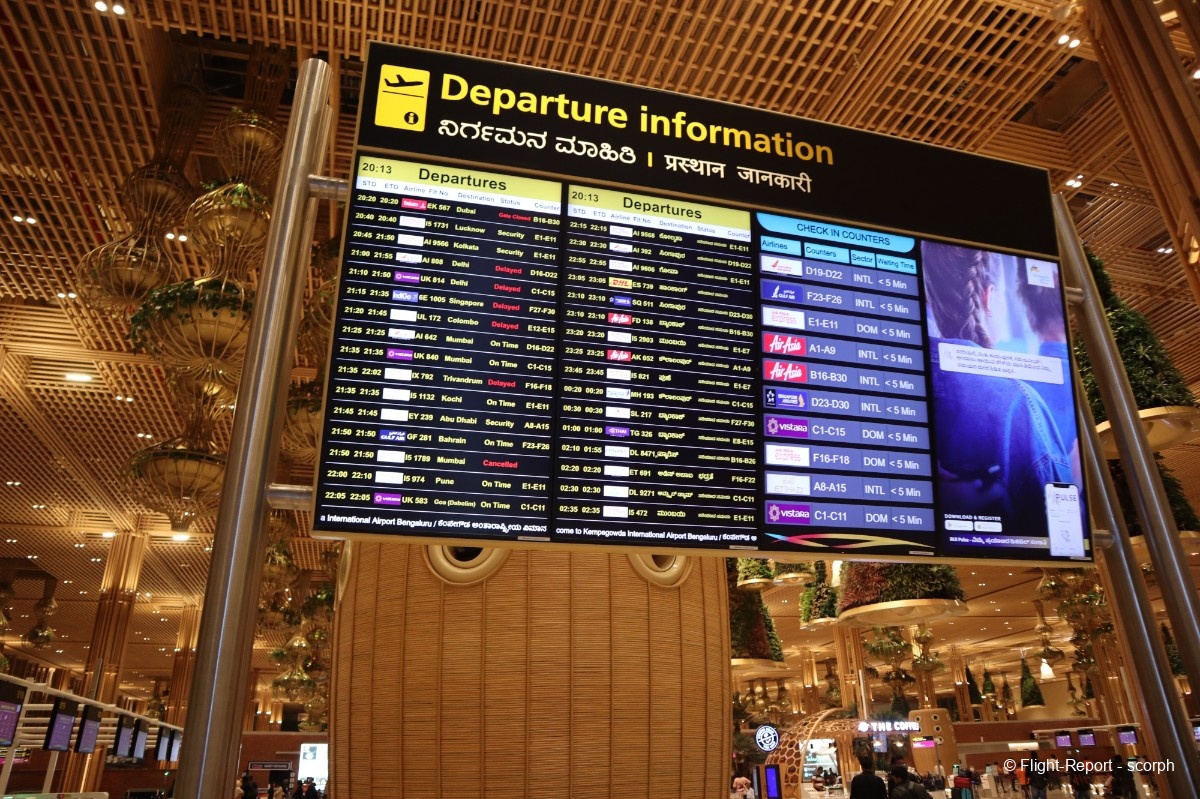
We walk straight past the Vistara check-in counters without stopping though we do notice that some of the ground staff are wearing Air India uniforms. Perhaps an early sign of the on-going merger?
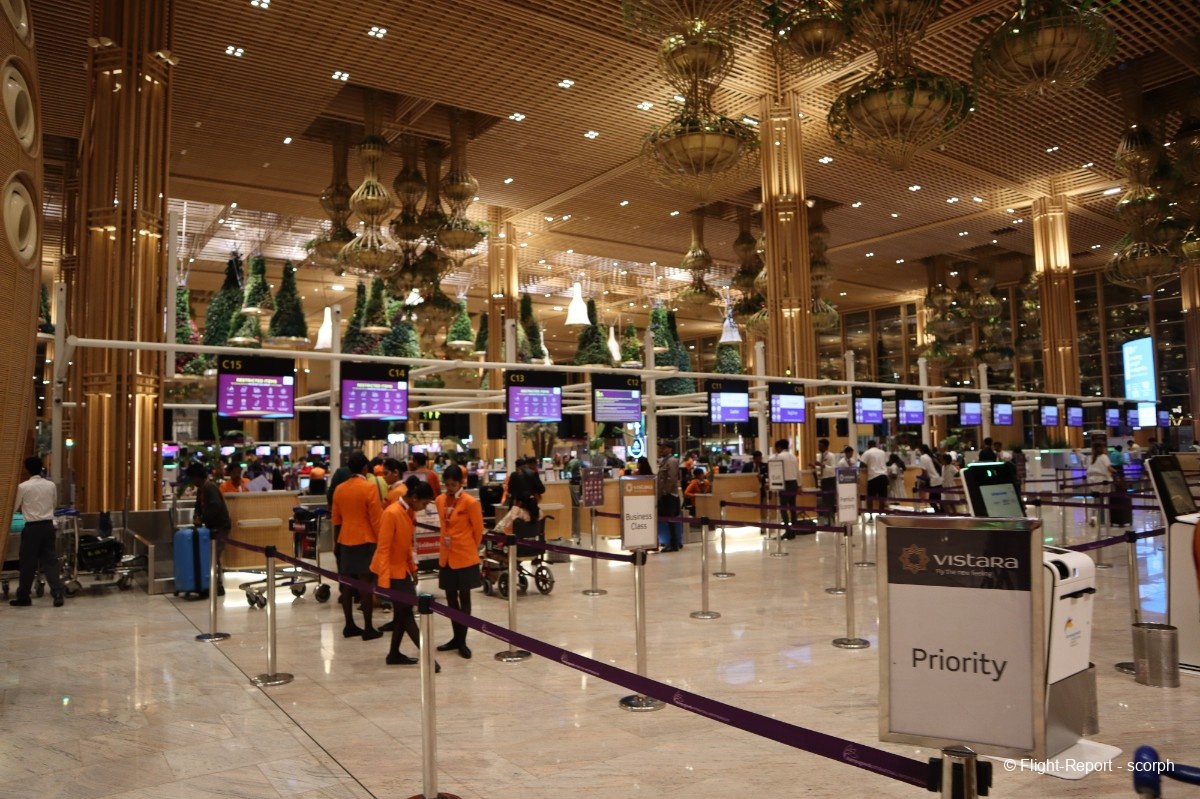
Security checks are located on either side of these impressive natural and plant-based decorations, which even include a small waterfall. It has to be said Indians really seem to have a thing for waterfalls…
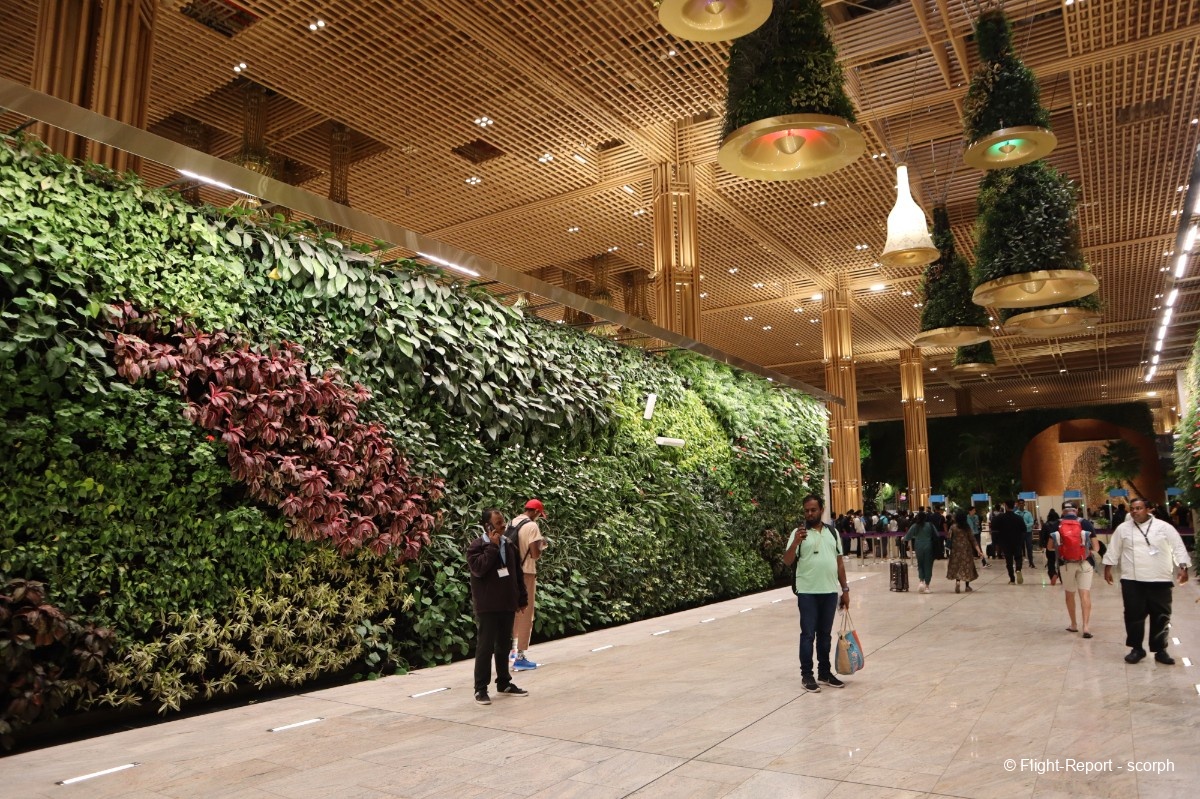
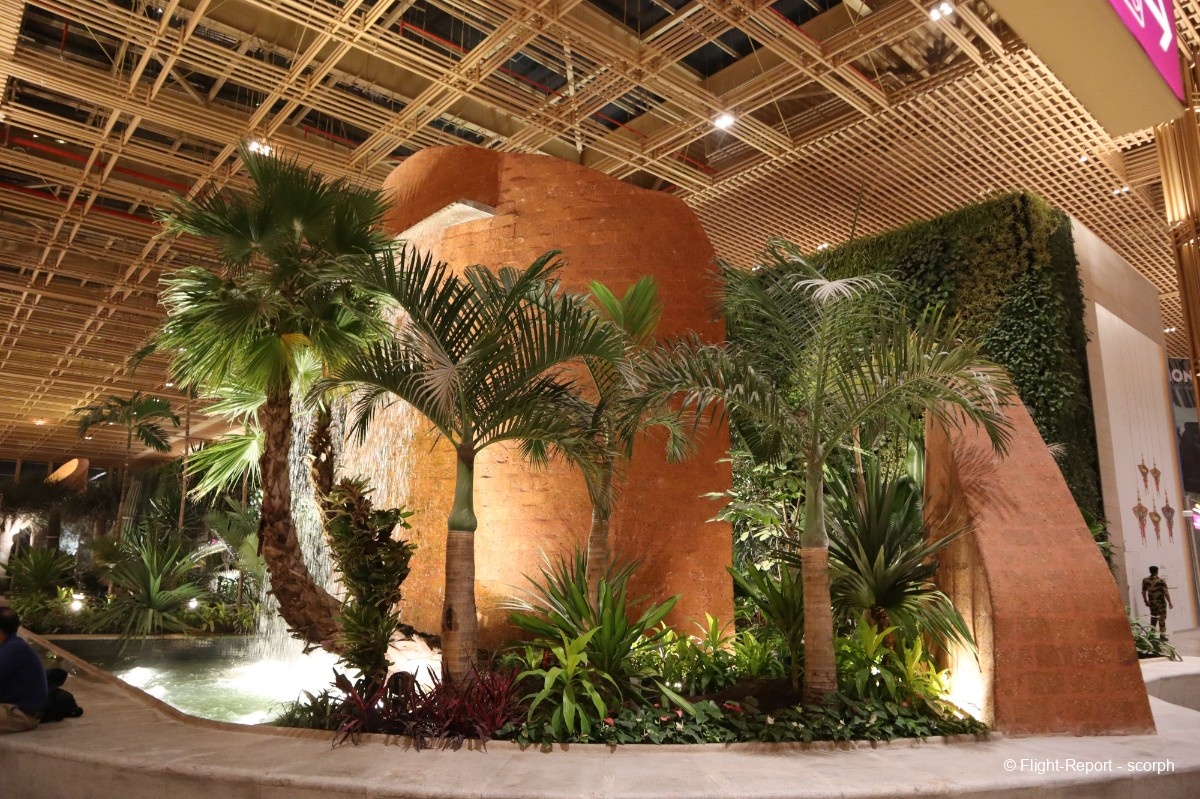
The domestic departures board at Terminal 2 is dominated by Vistara, Air India, and Air India Express. Some of the departure times are rather unusual like a flight to Mumbai leaving at 2:50 a.m., or one to Goa at 4:15 a.m.…
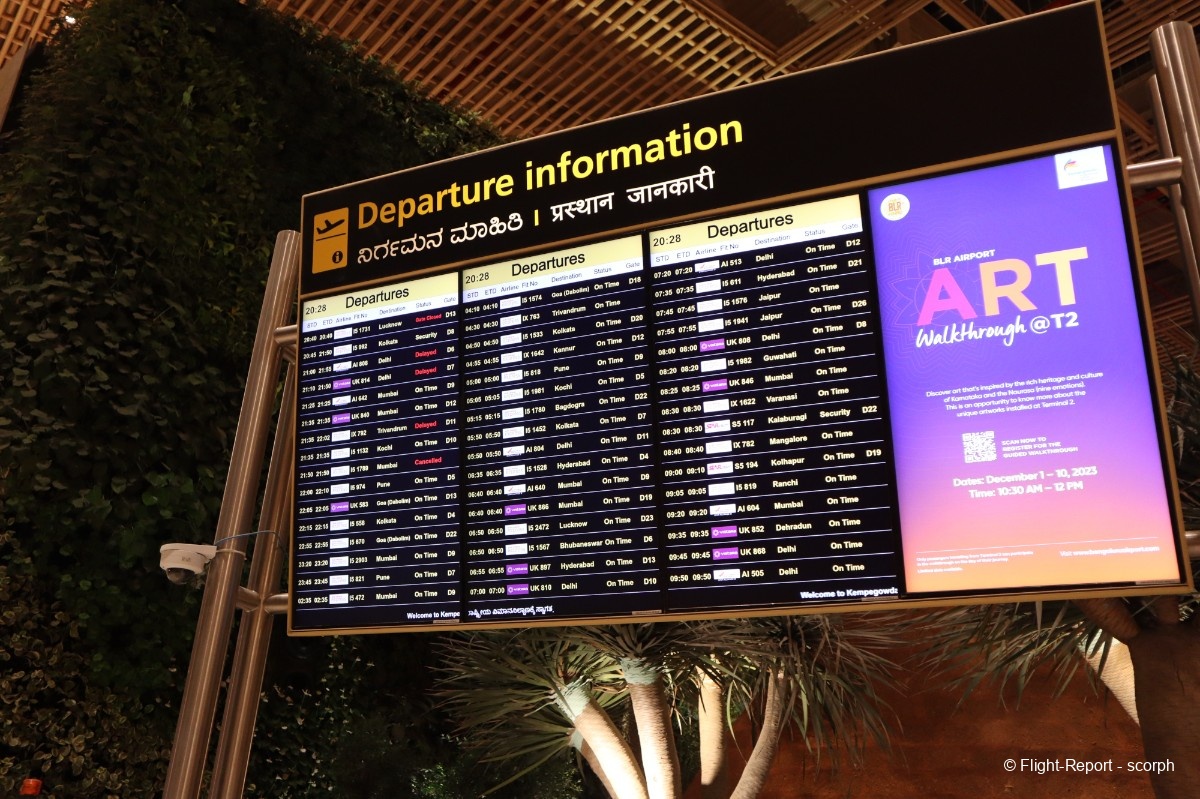
To reach the boarding gate area, you have to pass through this shopping zone, which features luxury brands and Western restaurant chains, but also many more local establishments.
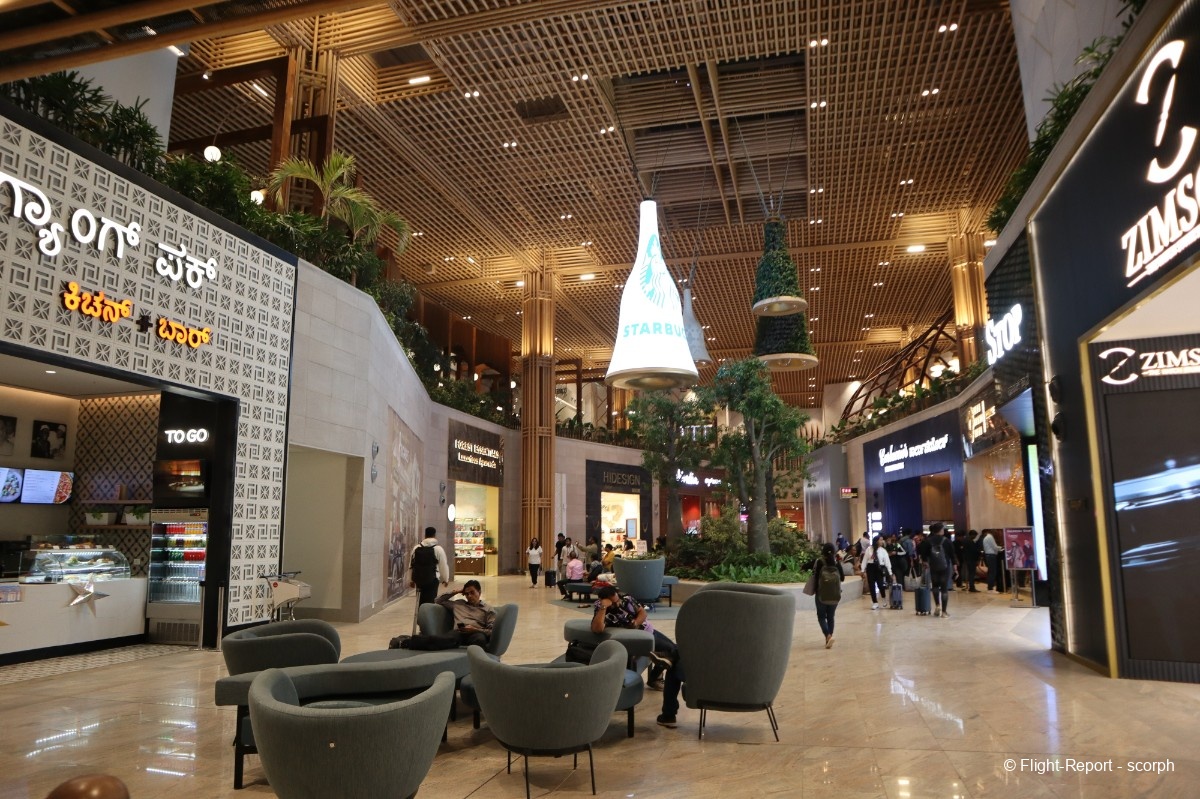
A domestic lounge is available, managed by the 080 restaurant chain. The area is popular, and I often noticed a long queue to get in. Interestingly, the same restaurant chain also runs the lounge in Terminal 1 as well as the international section of Terminal 2.
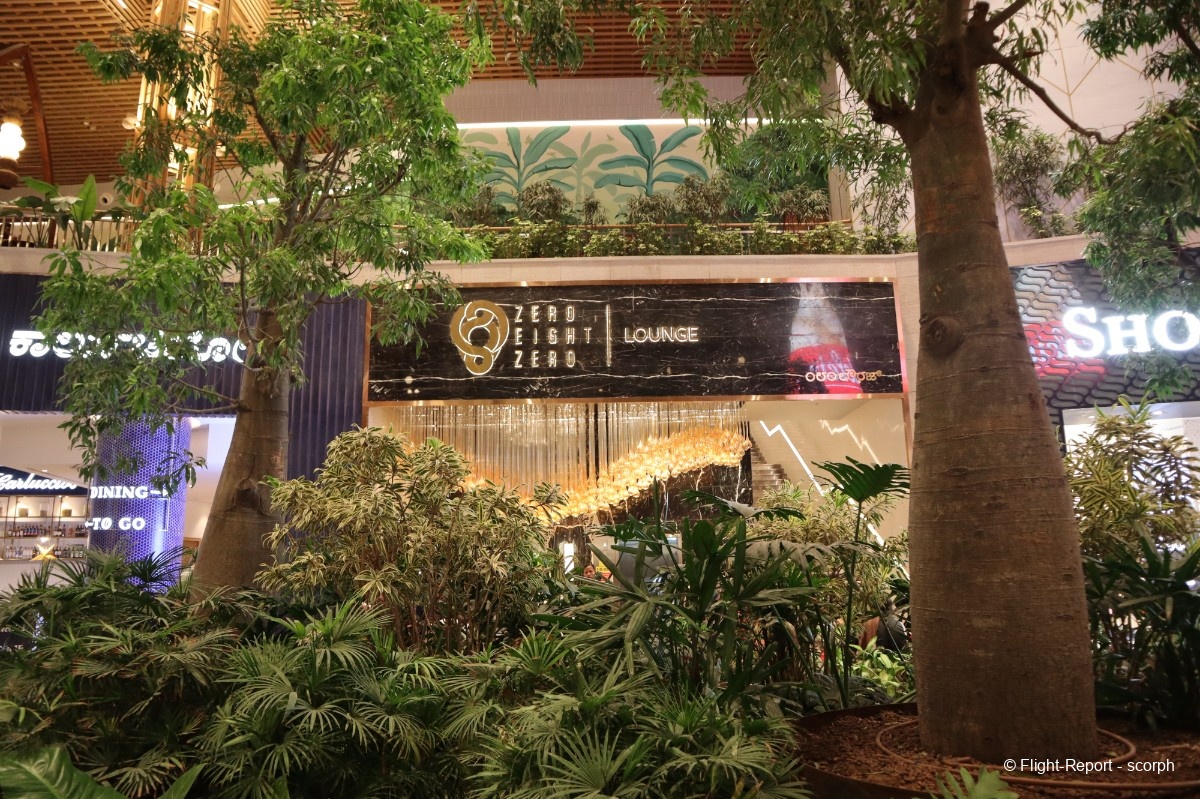
France is in the spotlight!
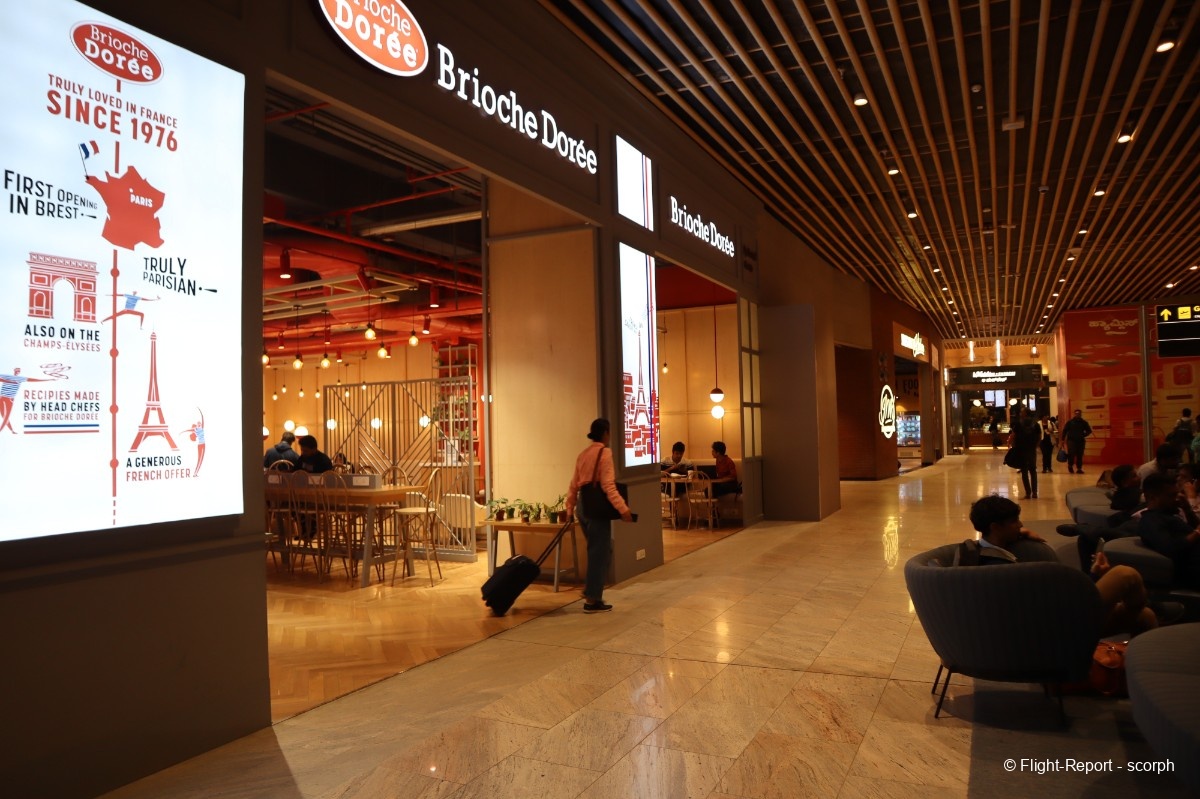
But on our side, we preferred to head to this spot offering Asian cuisine. Not exceptional and quite expensive. I’d recommend you give it a miss.
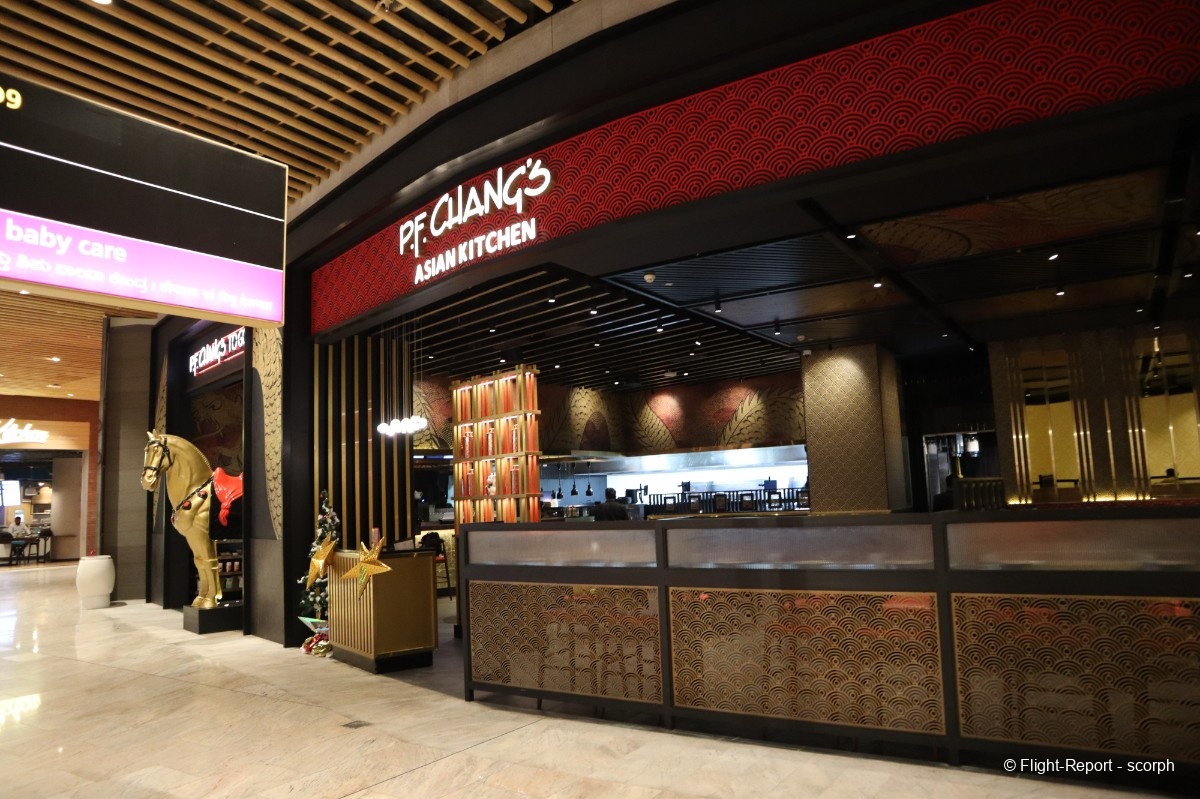
Once we’ve finished our meal, we make our way to the boarding gates, which share the same architectural style as the rest of the terminal with plenty of wood and natural light creating a pleasant and warm atmosphere.
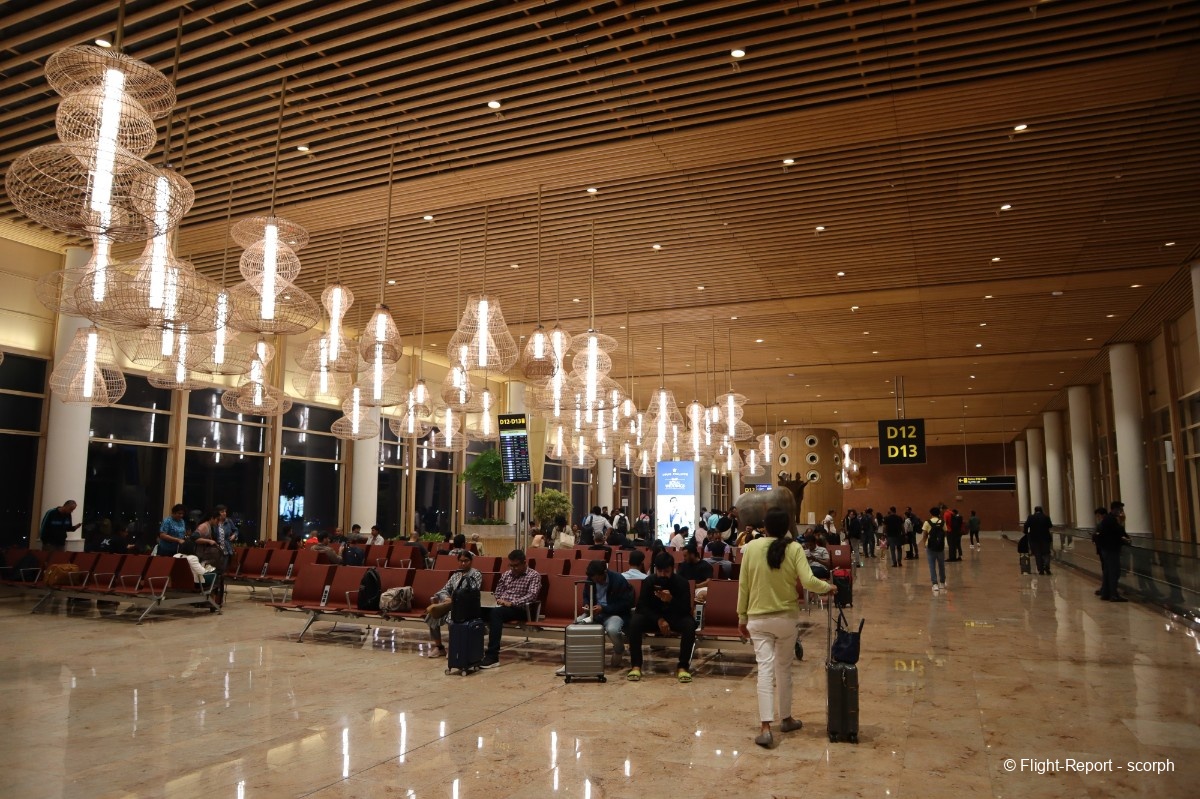
The area also features large floor-to-ceiling windows that offer a great view of the aircraft at the gates like this Airbus A320, formerly AirAsia India, which now flies under the Air India Express banner following Air India’s acquisition by the famous Indian industrial group, Tata. It has just arrived from Pune (Maharashtra state).
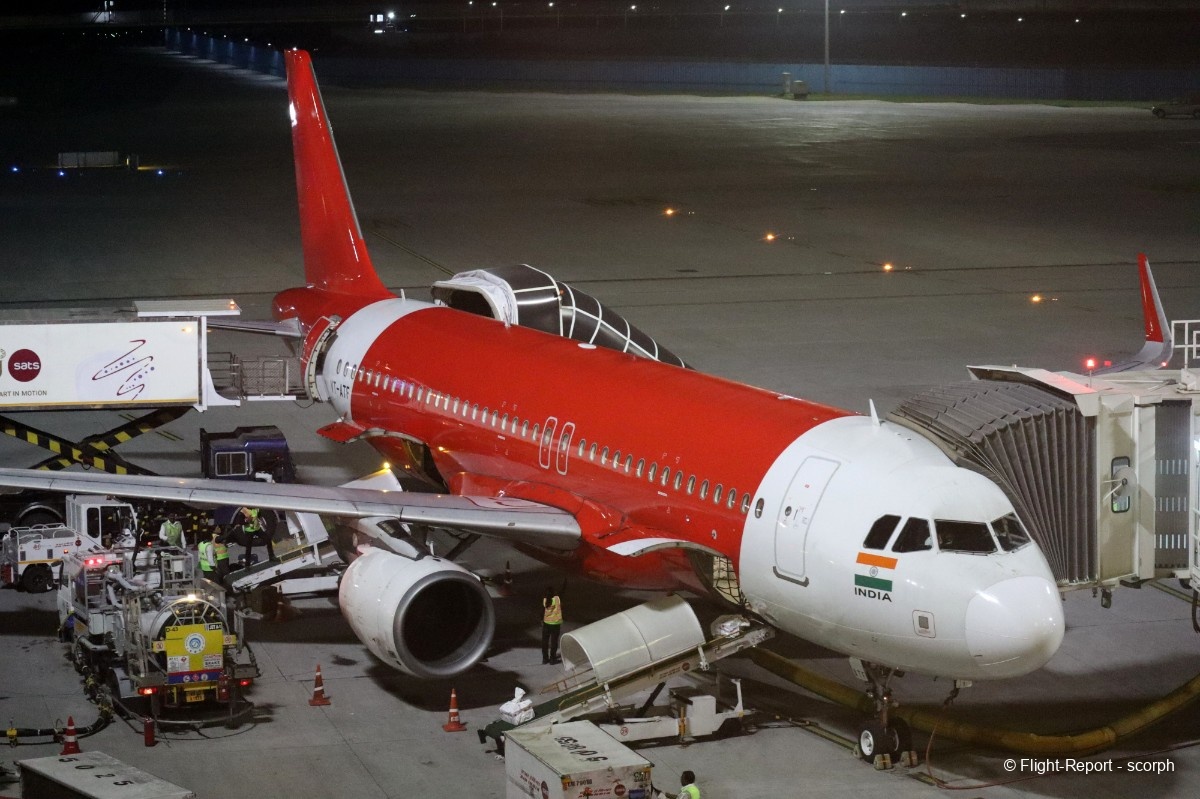
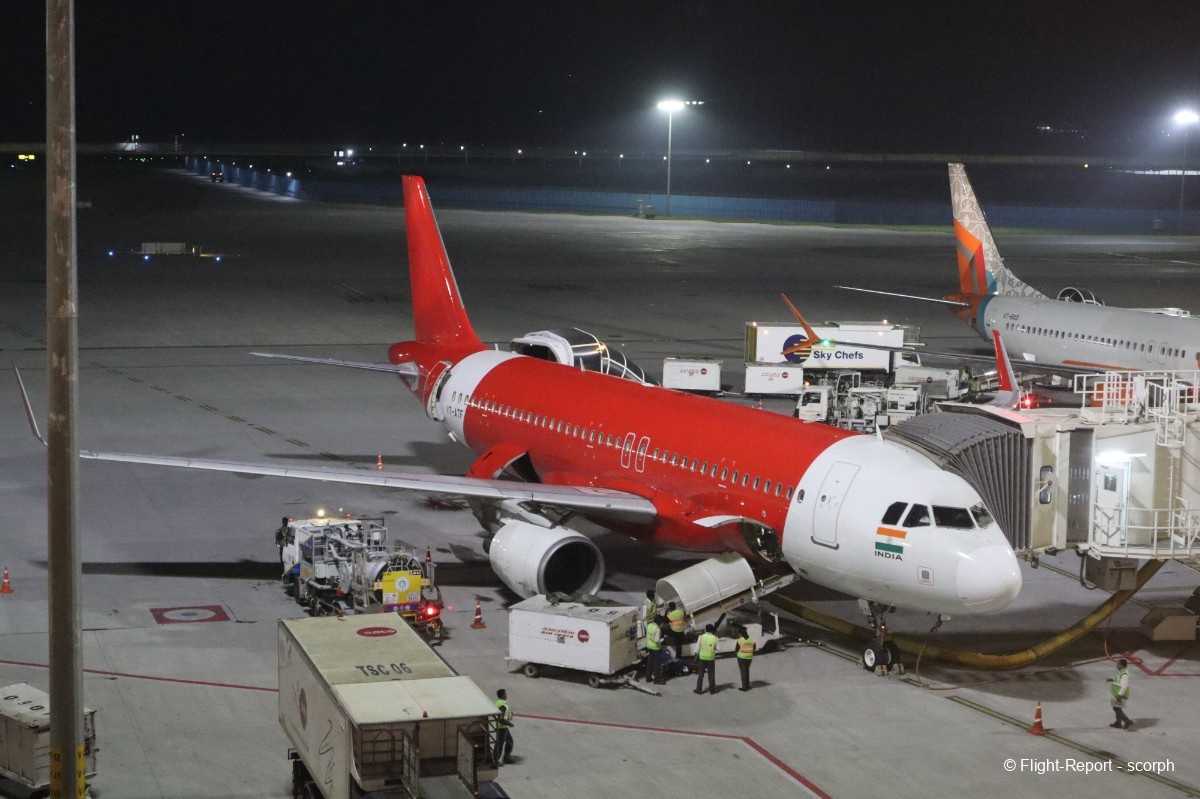
It won’t be long before it sports the new Air India Express livery (which I really like). You can see that here on a brand-new Boeing 737 MAX 8. It operates flight IX792 coming from Mangalore—does that ring a bell? Indeed, this is the copycat of my last report on the same flight, with exactly the same aircraft, just 5 days earlier.
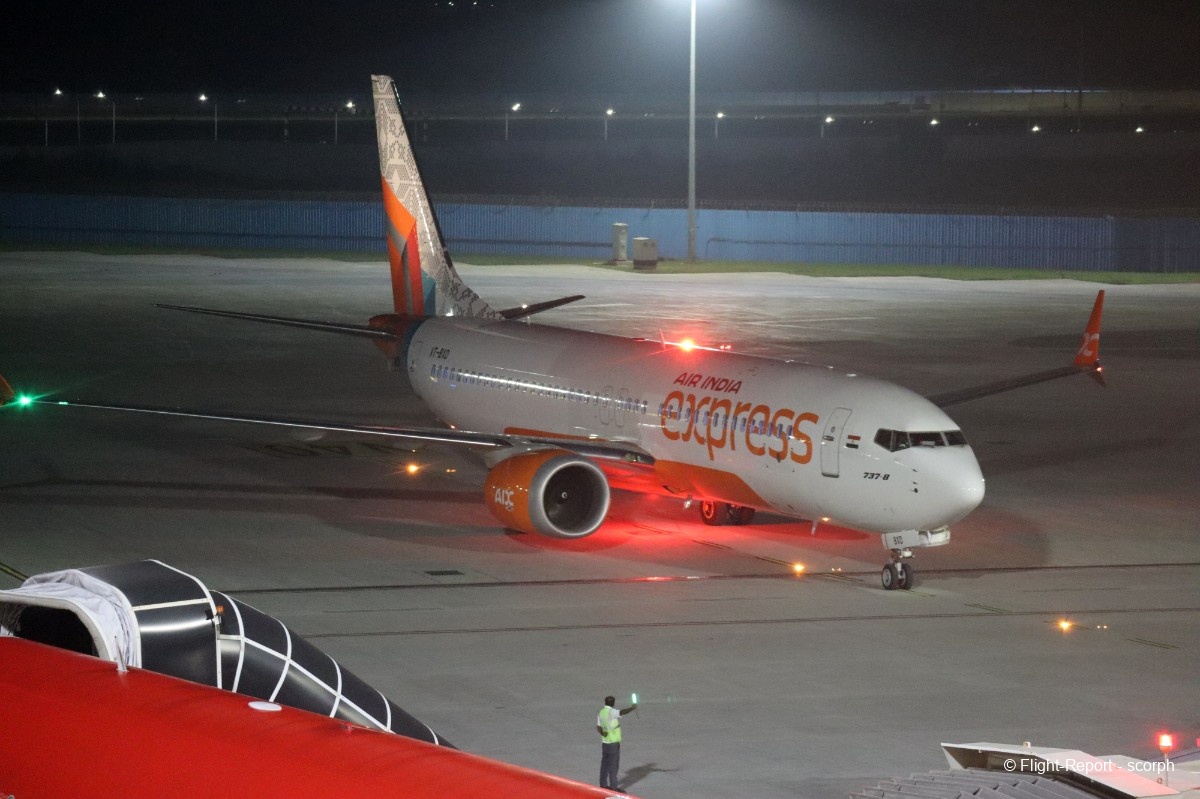
The parent company, Air India, is definitely present with this Airbus A319 preparing to depart for Mumbai
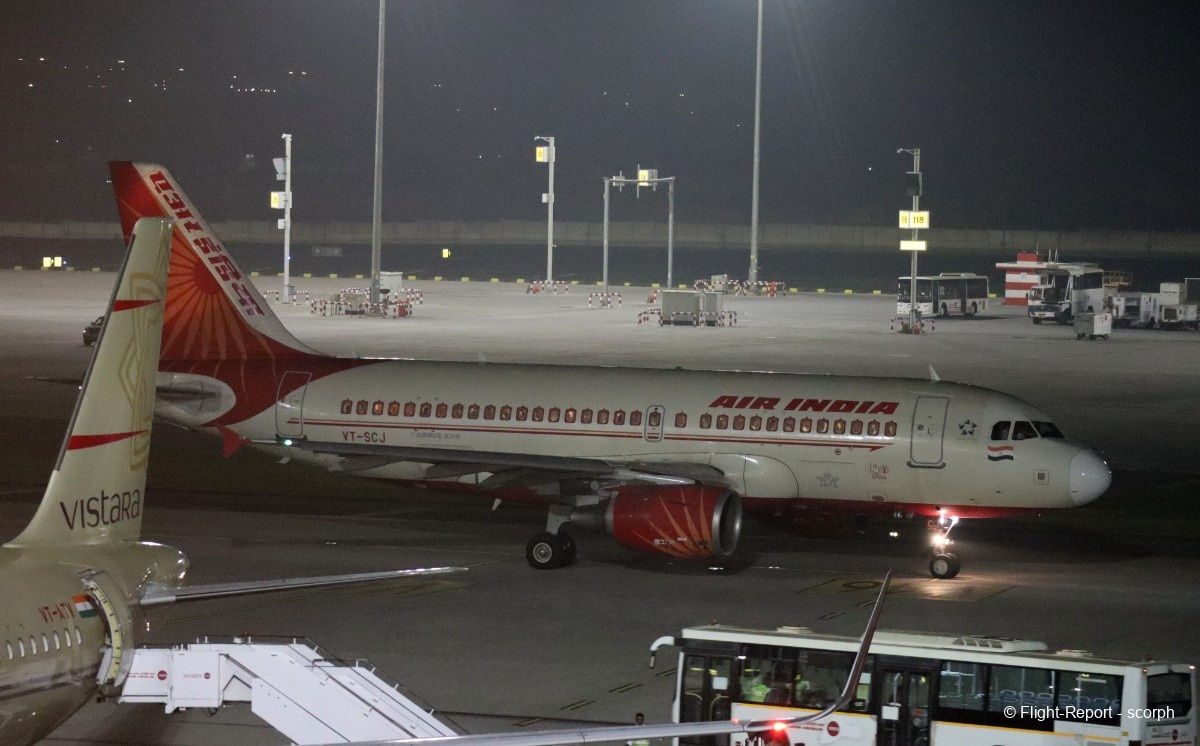
I had some difficulty capturing a good shot of this Vistara Airbus A320neo sporting a “fake” retro livery that pays tribute to the two main founders and owners of Vistara: the Tata industrial group and Singapore Airlines.
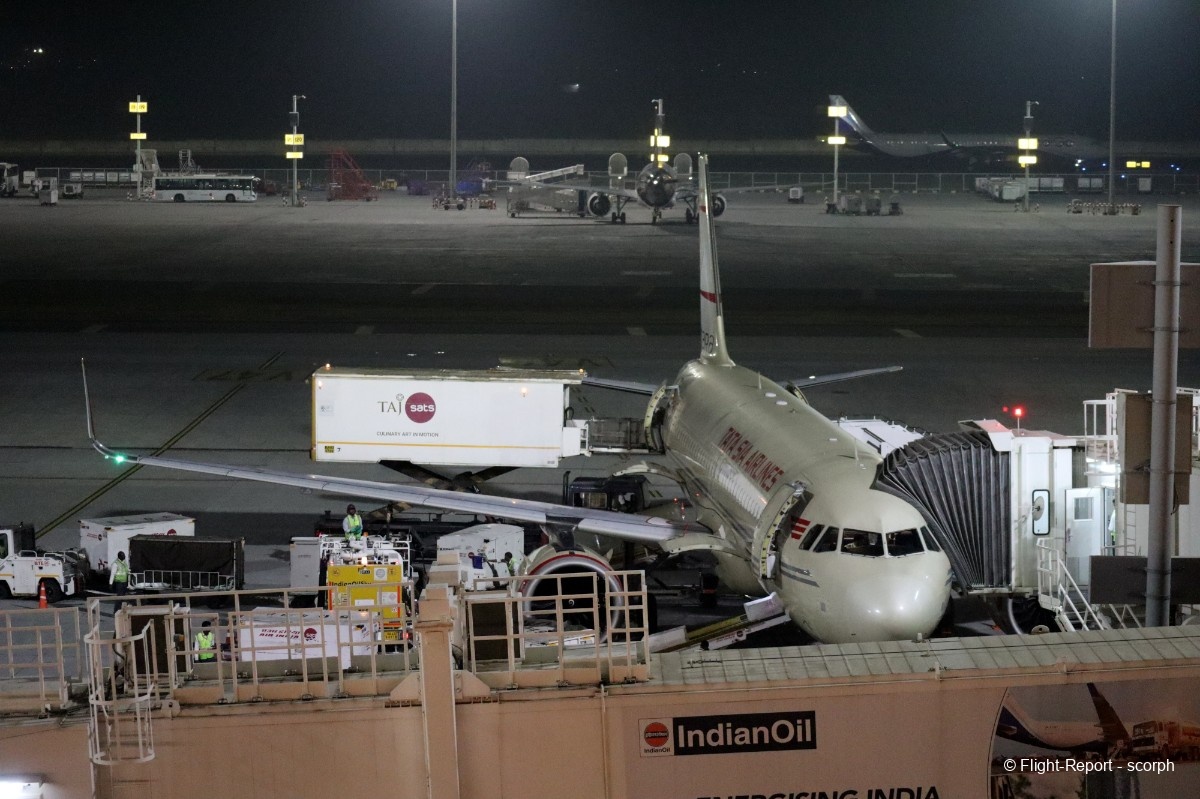
Quite a delay for this other Airbus A320 of Air India Express, which will depart for Kolkata more than 2 hours and 30 minutes late.
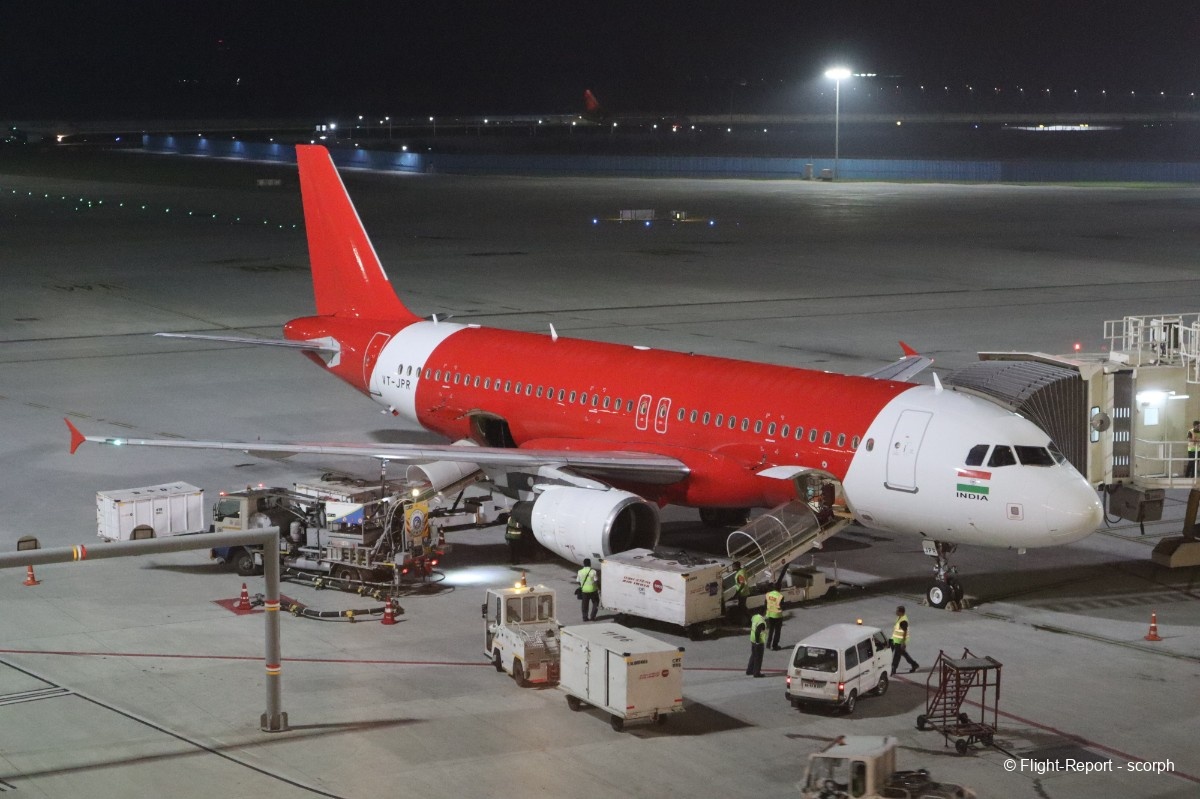
This one, however, will be on time to reach the economic capital Mumbai (Bombay). As you’ve probably noticed, it’s a Vistara Airbus A320neo.
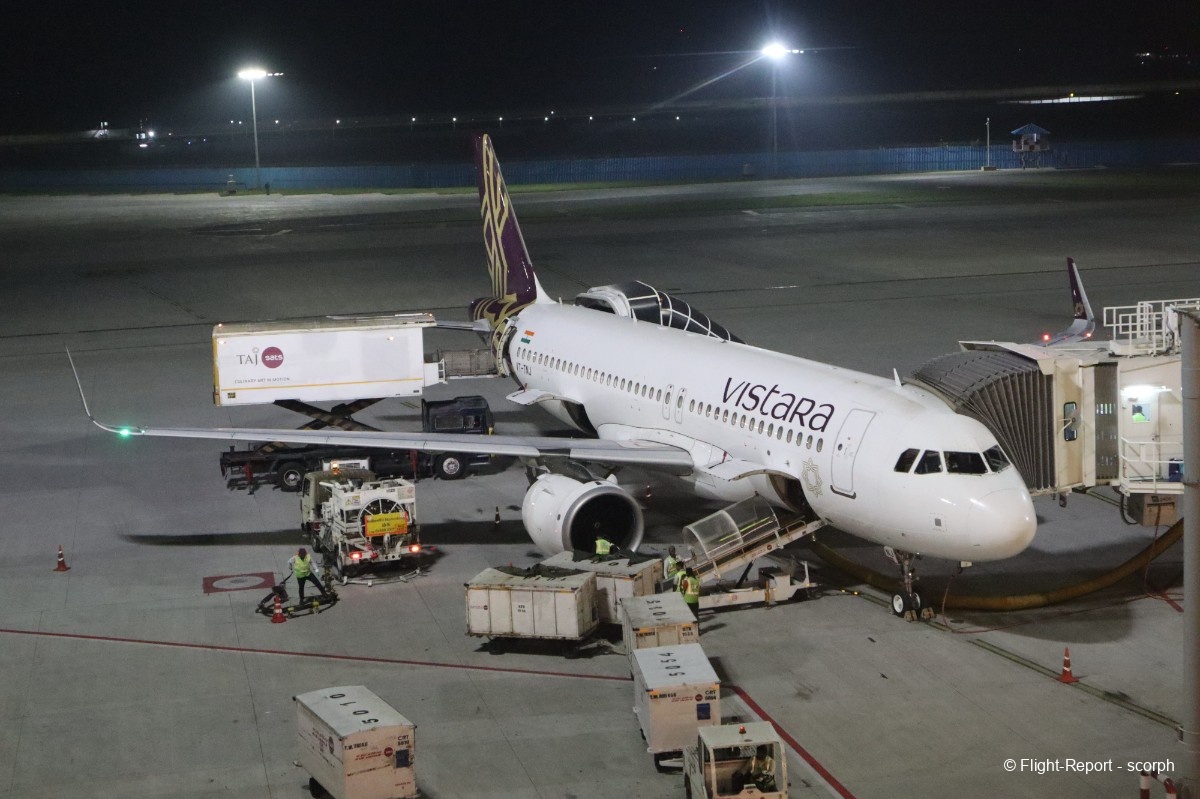
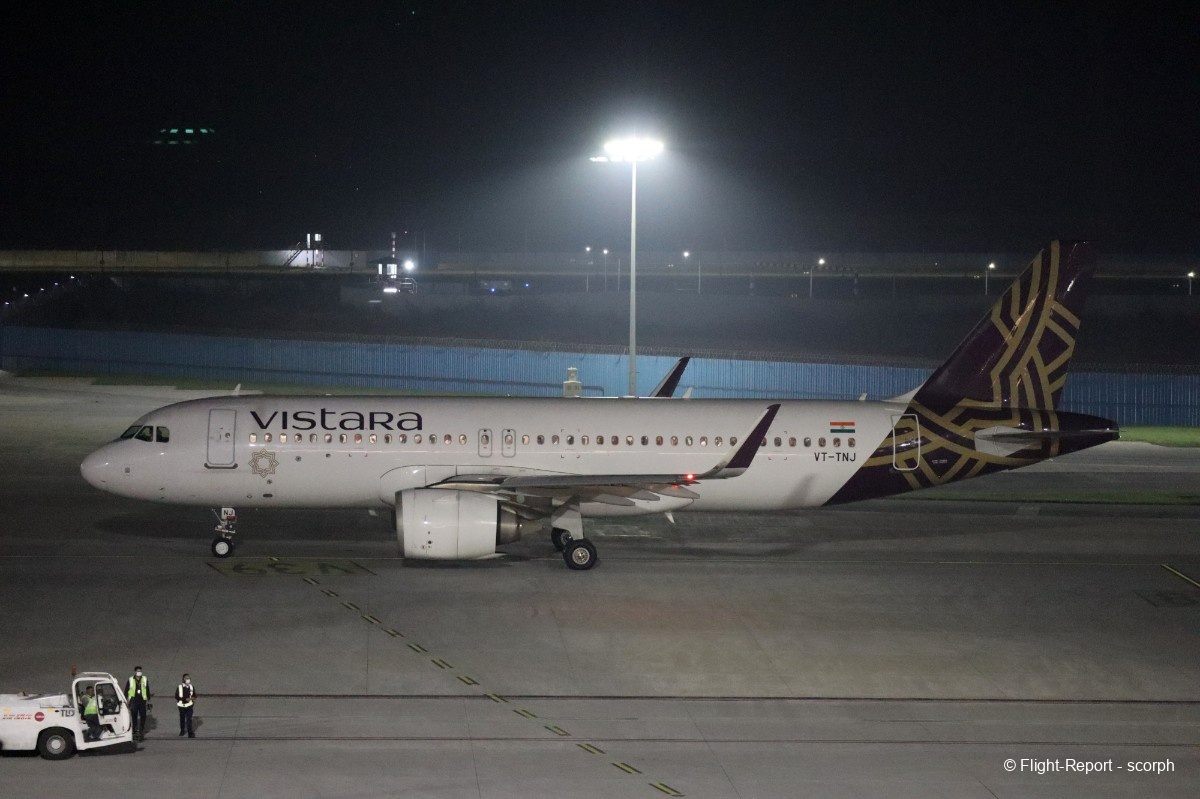
Well, time is flying and our flight will be boarding soon. I join my colleague, who was waiting by our gate, reading a book.
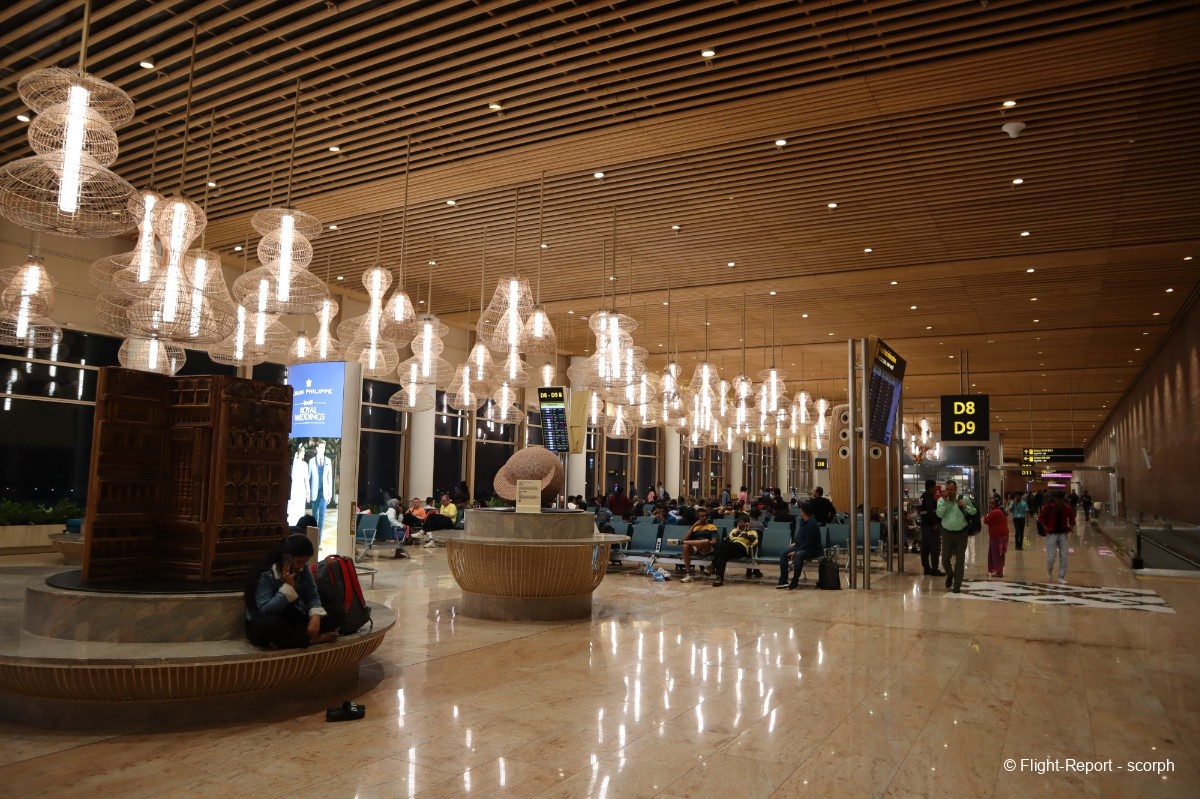
It will be Gate D13 for this night flight.
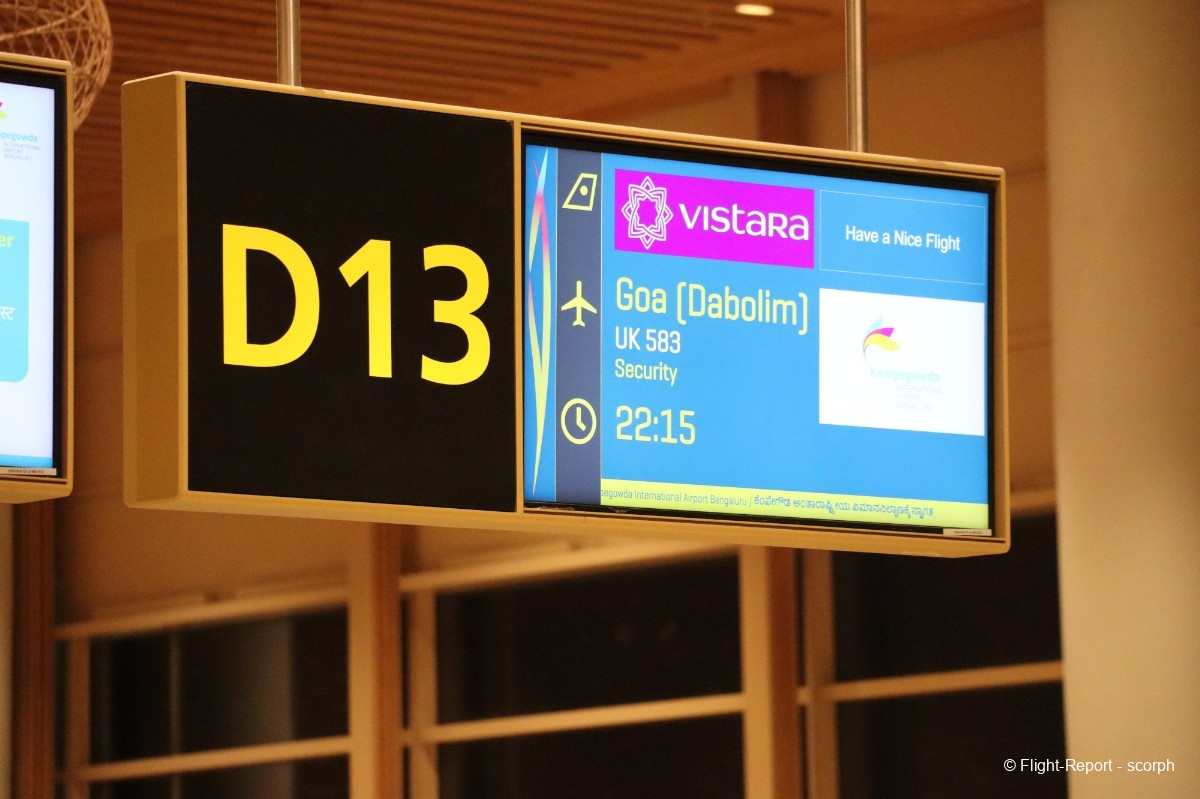
Luckily, our aircraft is already there. A bit of a disappointment for the av-geek that I am. It’s the same plane I flew to Hyderabad on just a few weeks earlier. It’s still an Airbus A320neo, registered VT-TYB, delivered to Vistara a little over two years ago. It has just arrived from Mumbai.
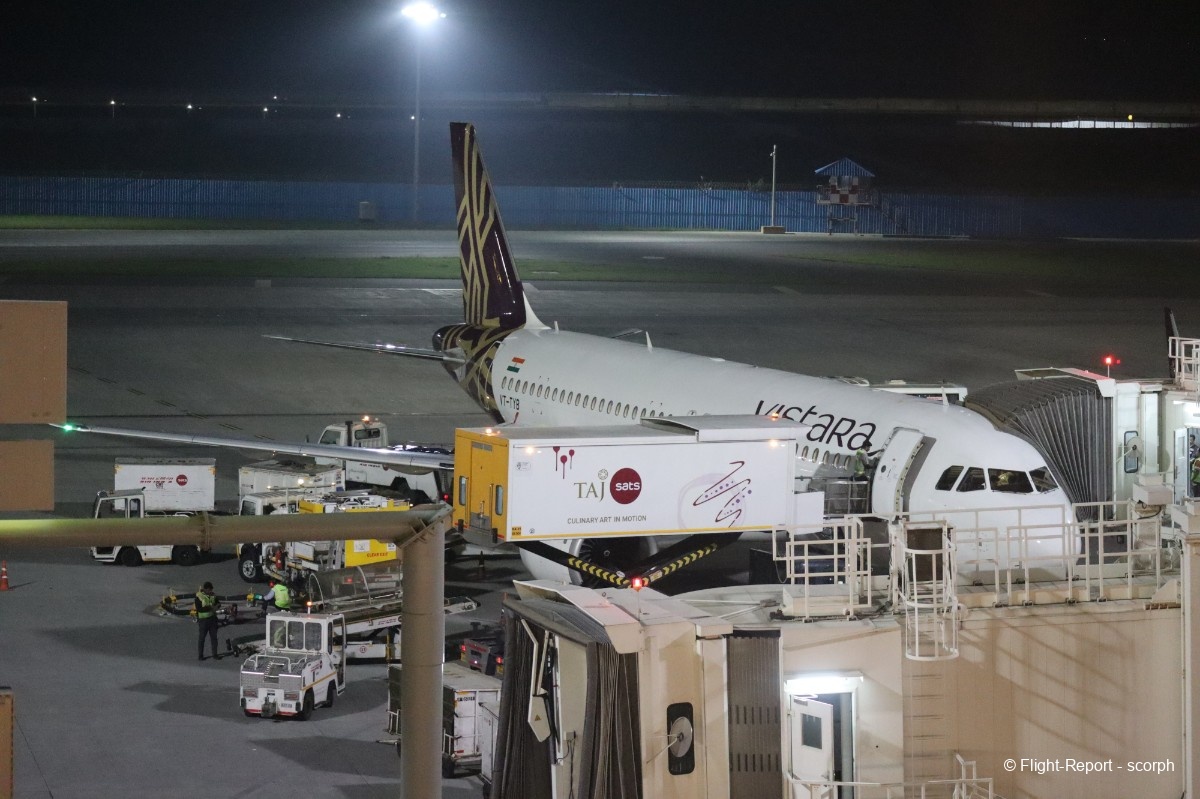
Boarding and boarding pass checks are quick and efficient, and soon we make our way down the jet bridge connected to our aircraft.
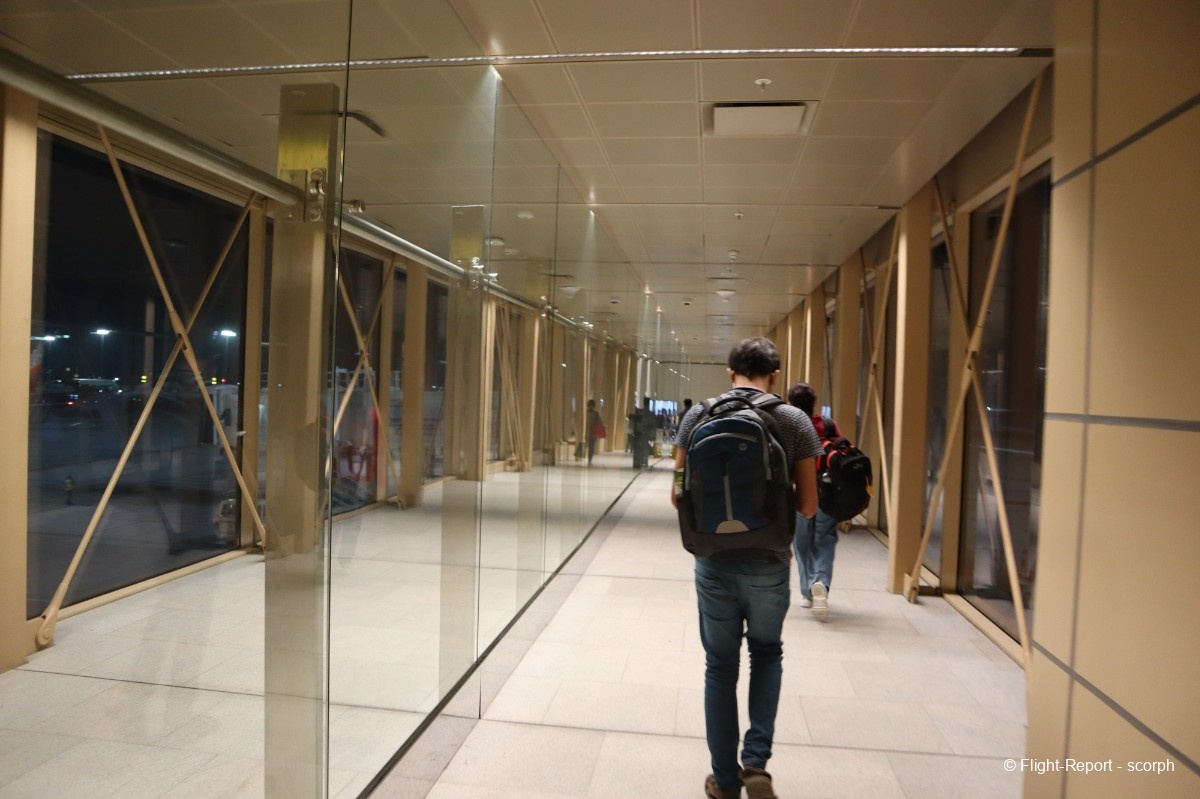
On the way, we get a nice view of today’s neighbor, another Airbus A320 of Air India Express, which has just arrived from Bhubaneswar (Odisha state).
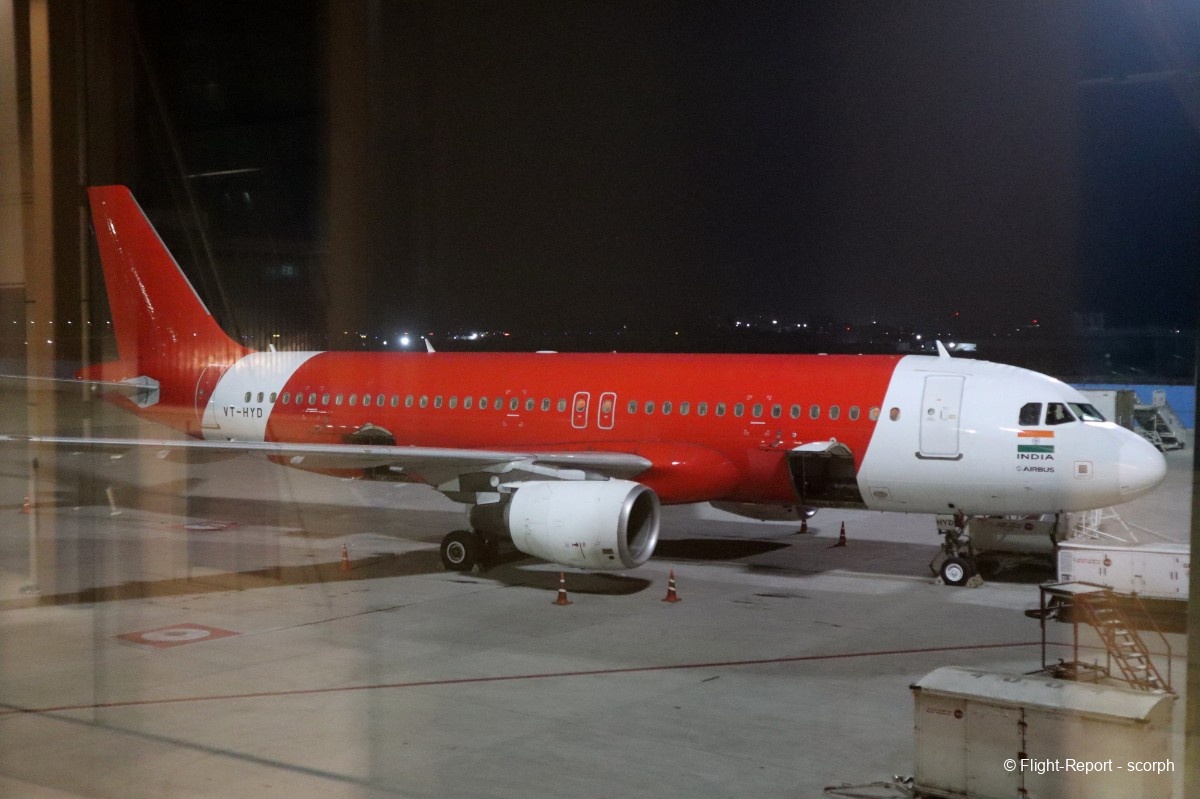
I Bangalore too, the jet bridges bear the colors of an oil company, but this time it’s a local one: IndianOil.
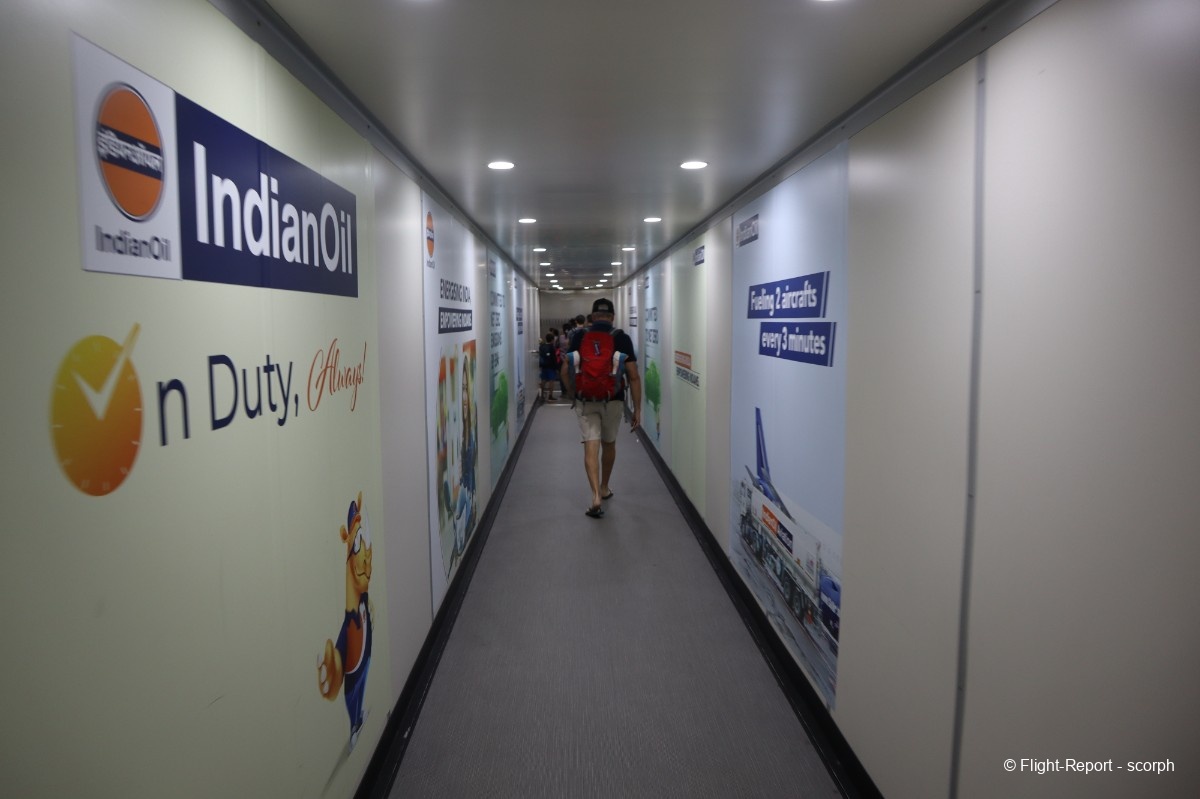
On board Vistara A320neo
Aircraft front door. The welcome on board from our cabin crew will be friendly and smiling.
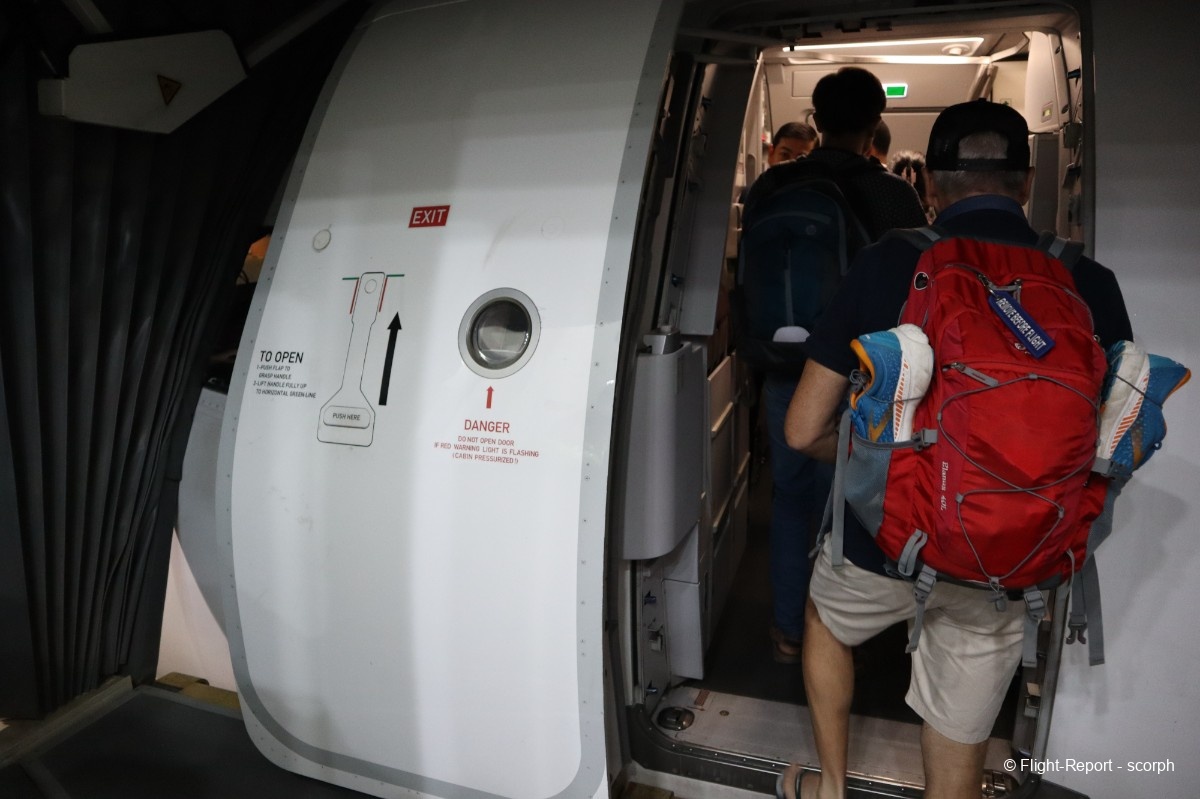
On board, the cabin features gray and purple tones, with seats from manufacturer Collins Aerospace that closely resemble those found on Air France’s Airbus A220. The attention to detail is notable, especially with the purple seat belts.
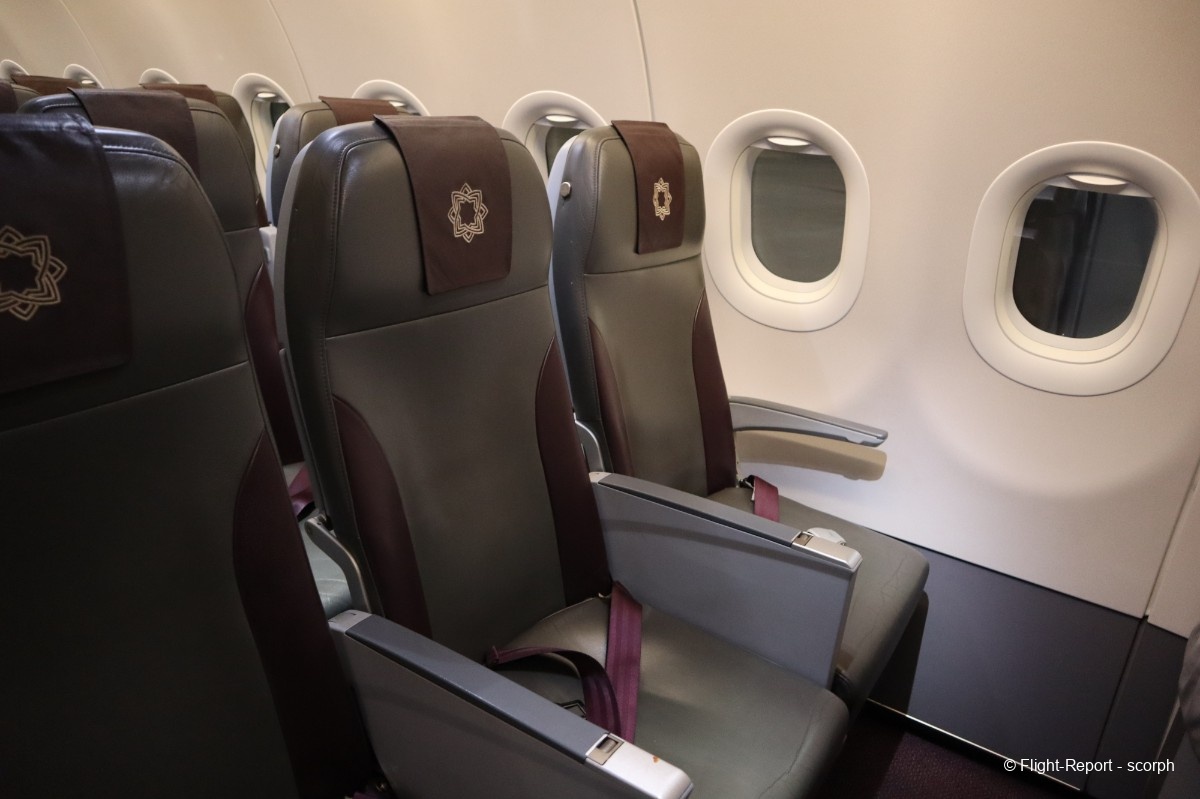
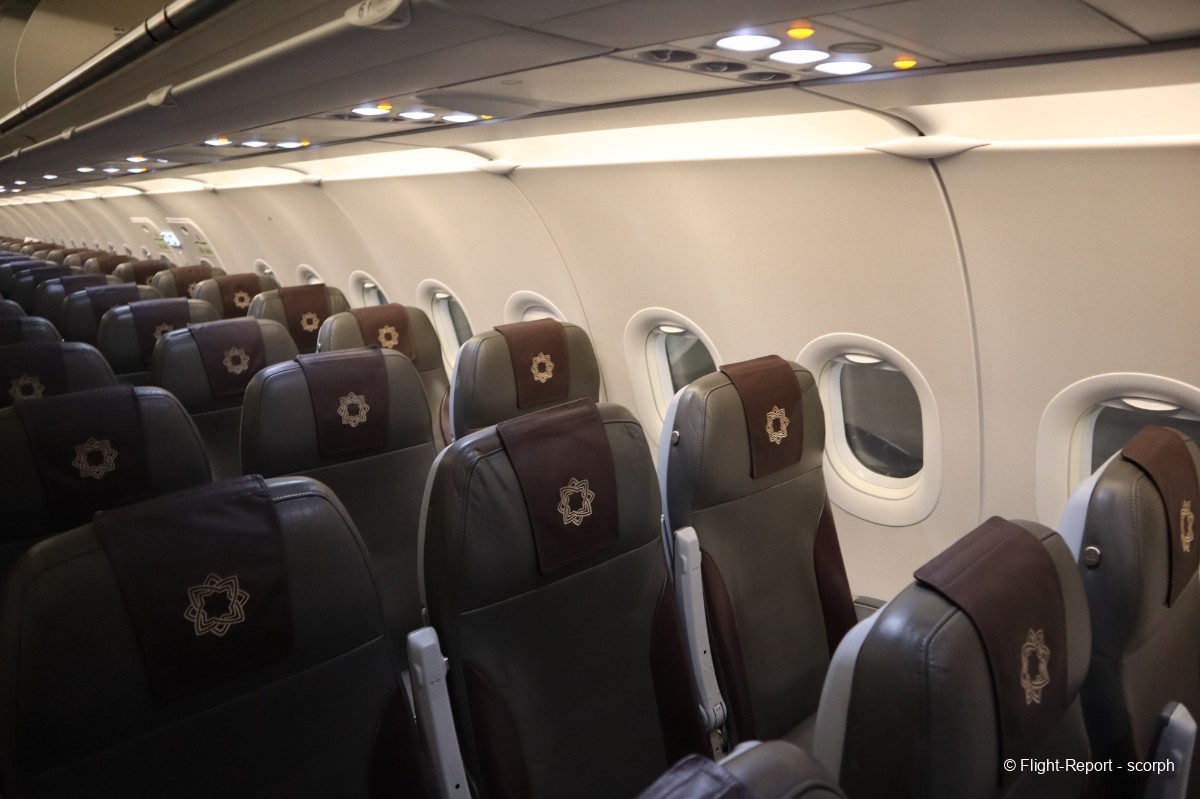
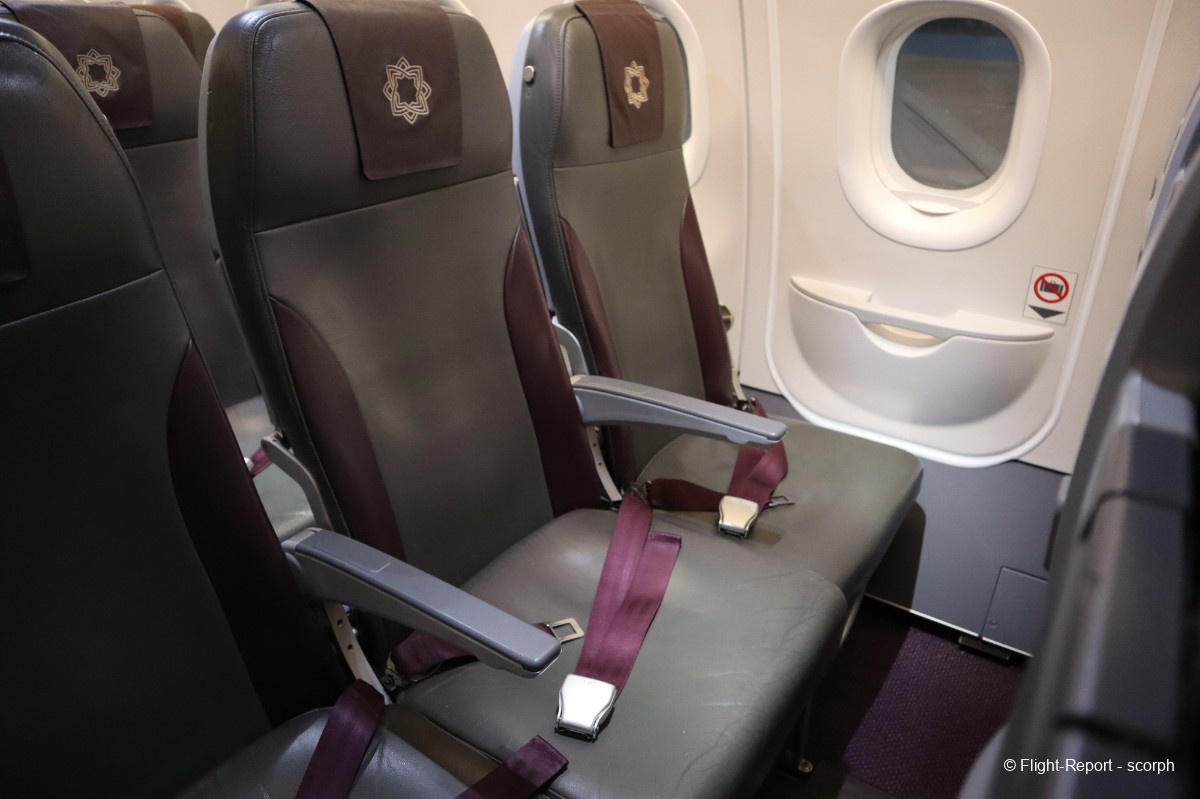
However, the seat pitch isn’t huge I’d say no more than 28 inches in the rear section; it was a bit better toward the front of the cabin. Notably, there’s an advertisement for real estate investment in Dubai, featuring a name that doesn’t quite sound like it’s from the Gulf region…
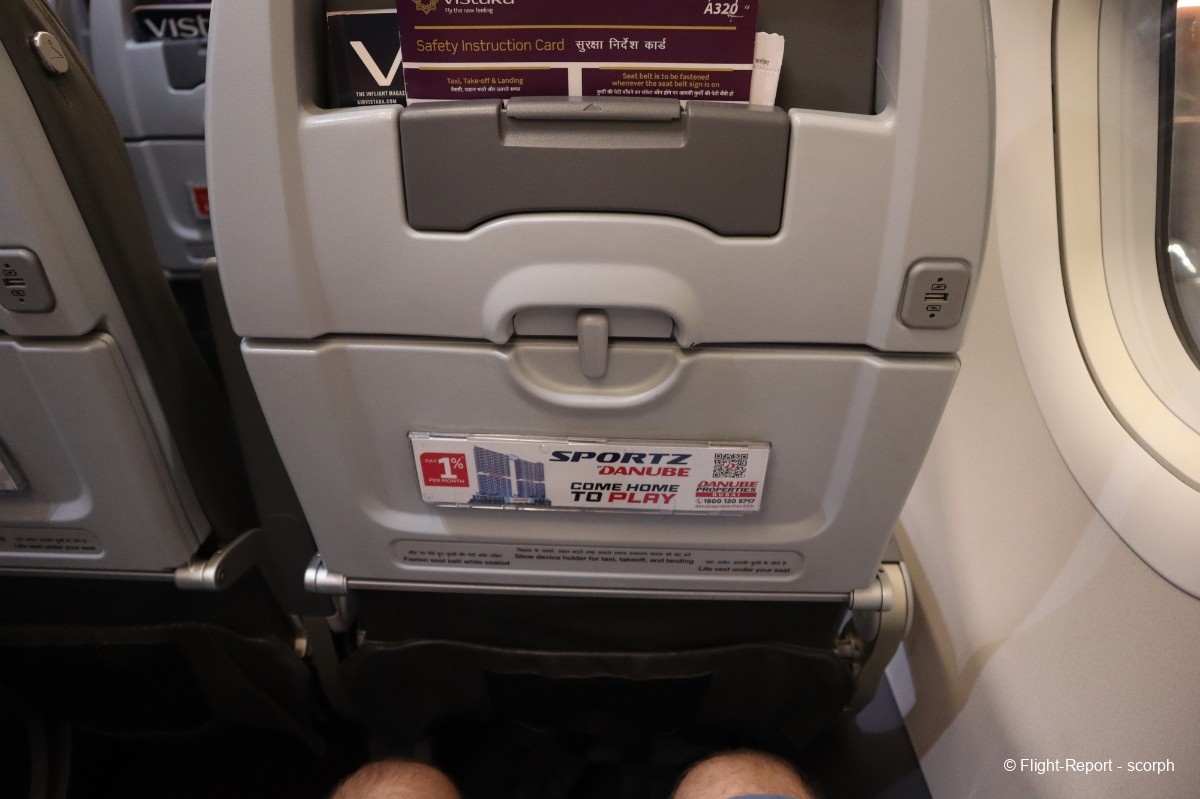
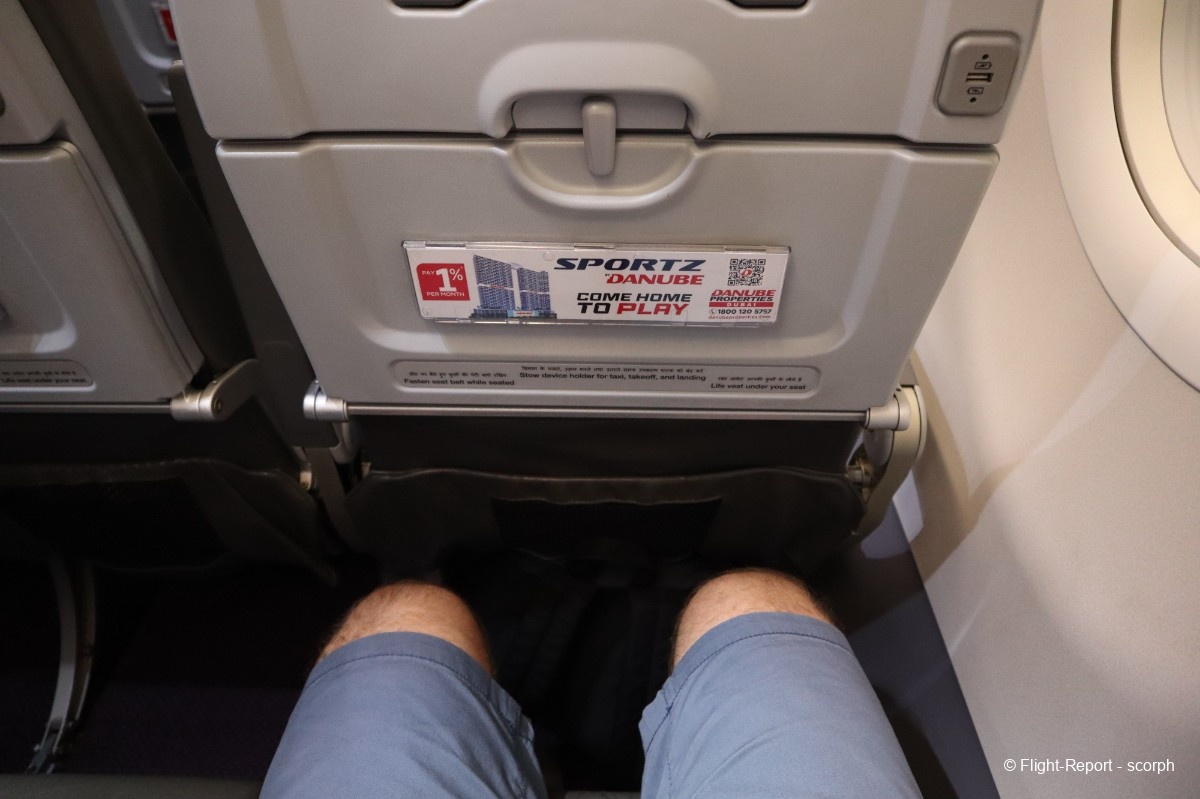
The cabin layout according to Aerolopa: 180 seats in this full economy configuration.

The boarding, swiftly and smoothly conducted, will soon come to an end with the cabin showing full occupancy.
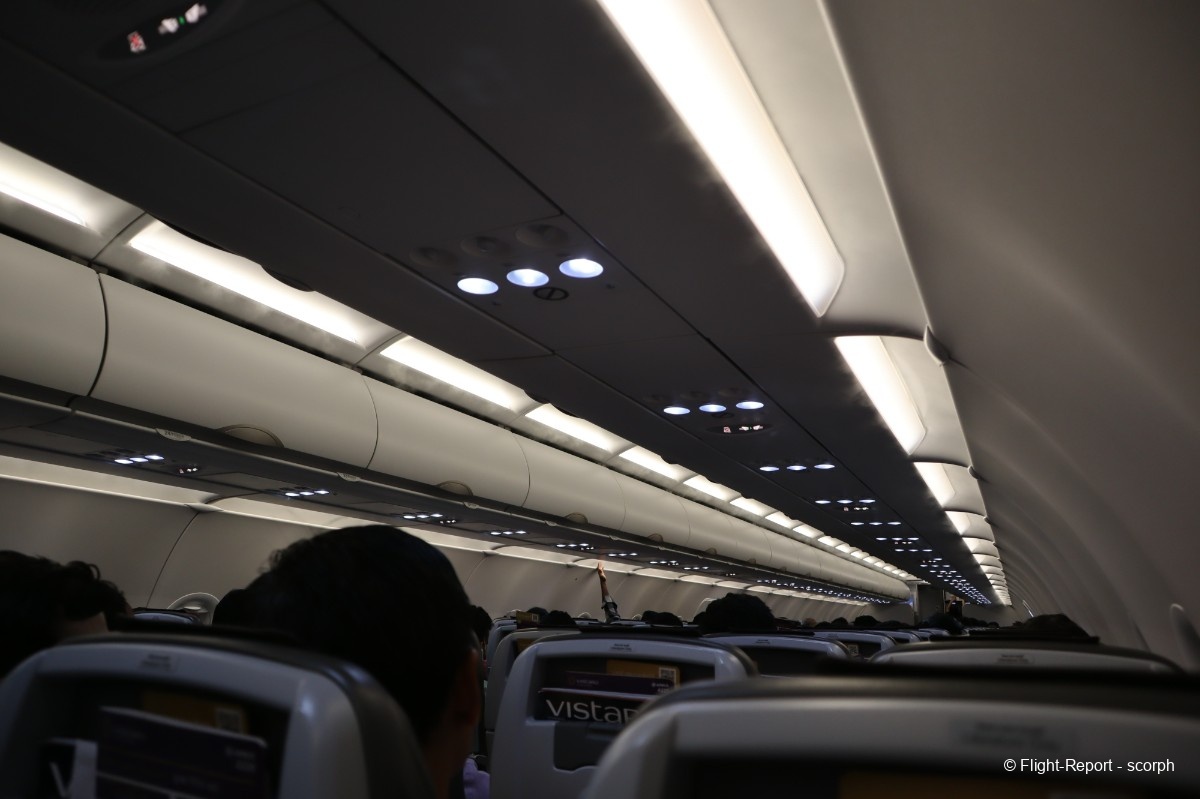
Outside, the cargo holds are finishing being loaded, and I take the opportunity to snap a photo of our sharklet with its logo. We will push back right on time, and the safety demonstrations will be performed manually by our cabin crew in Hindi and English.
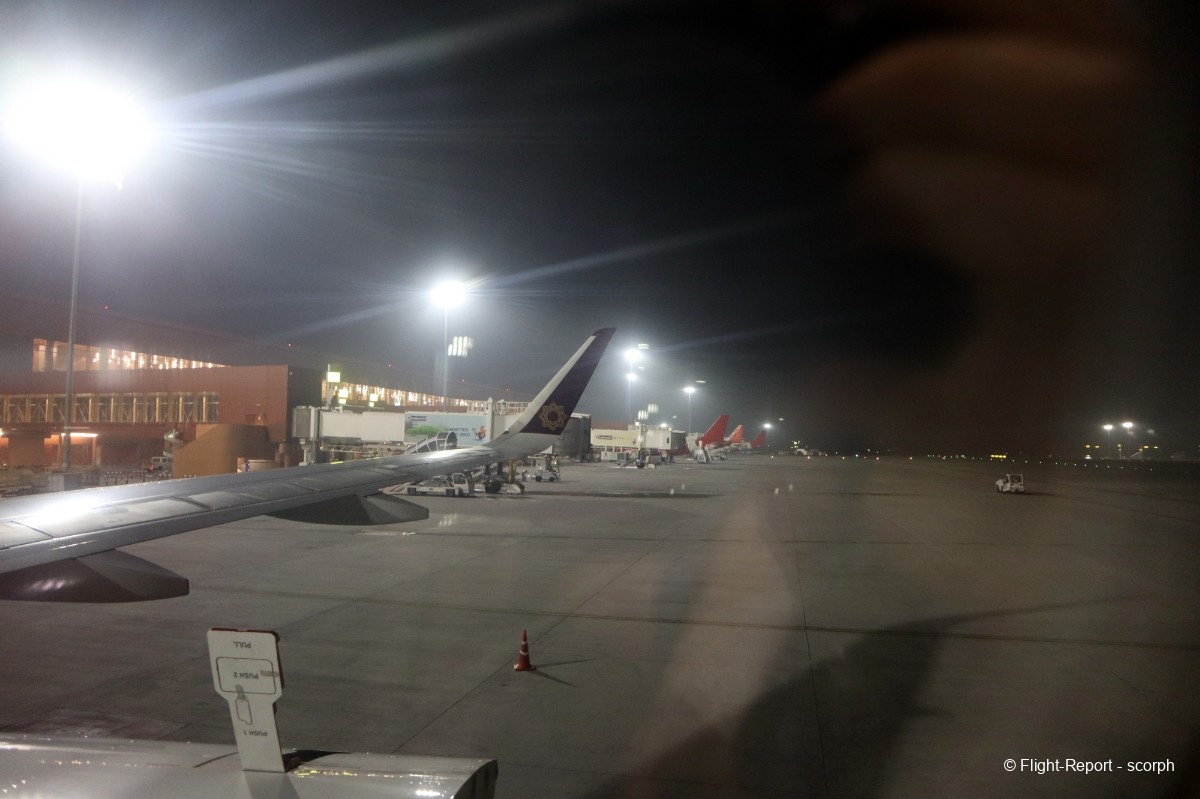
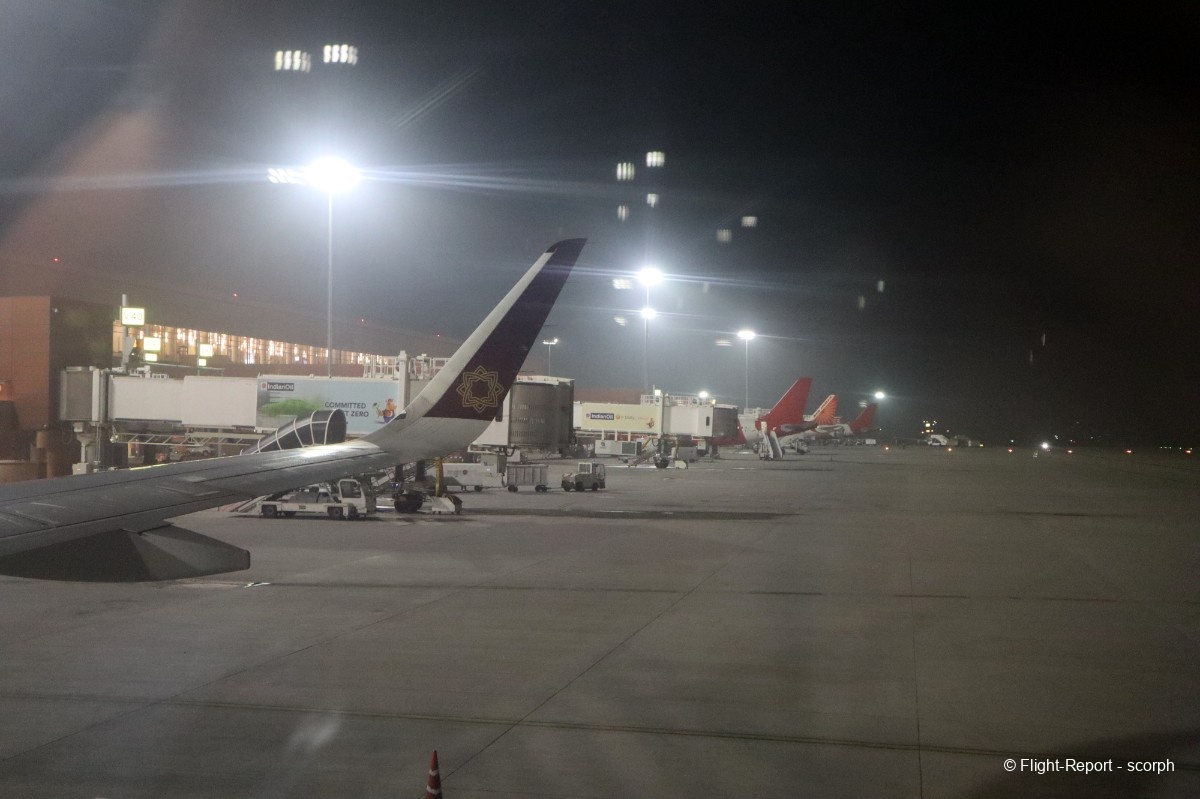
Taxiing to runway 09R will take a bit of time, as we’ll need to taxi along a large portion of the runway. However, without any further delay, our crew will push our two CFM Leap engines to takeoff power, and without any difficulty, our A320neo will lift off from the tarmac.
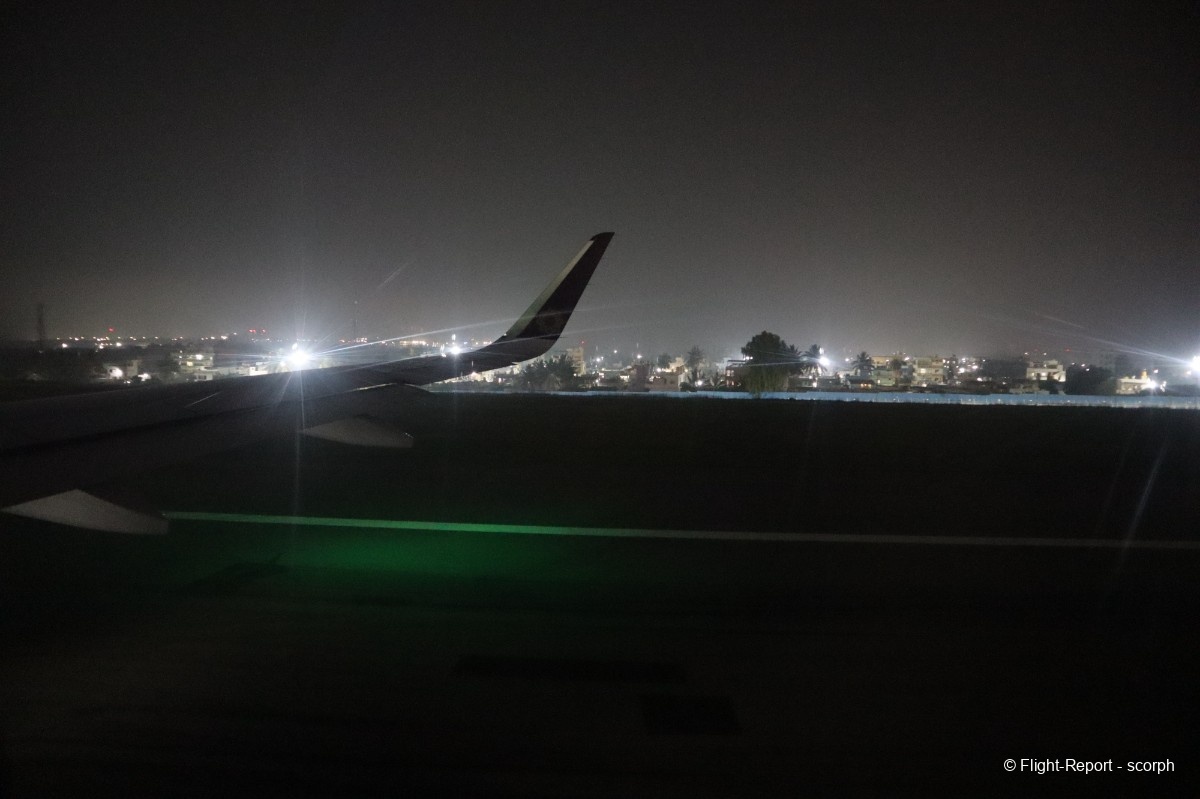
The initial climb takes us over the industrial zone under construction just south of the airport. It must be said that this new airport, built in 2008, was somewhat constructed in the middle of nowhere, and only now does the area seem to be developing.
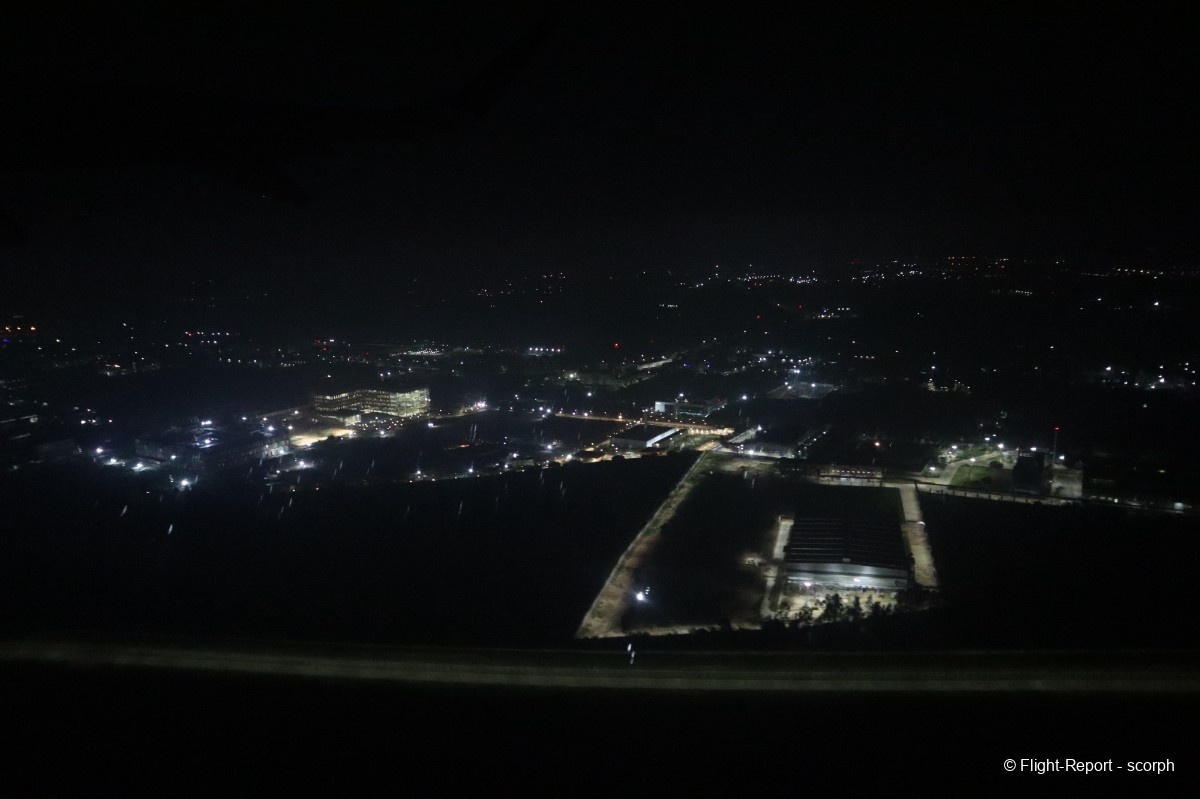
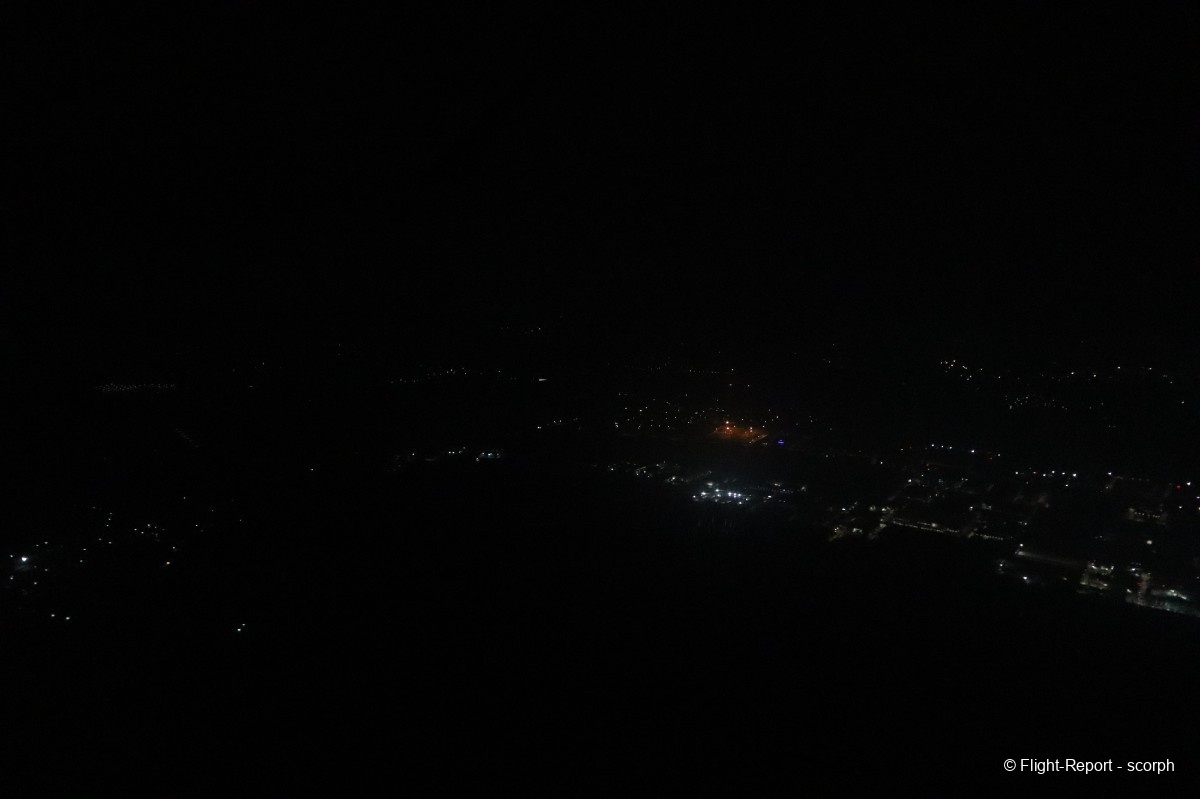
During takeoff and landing, the cabin lights are dimmed, with only a soft purple mood light illuminating the cabin.
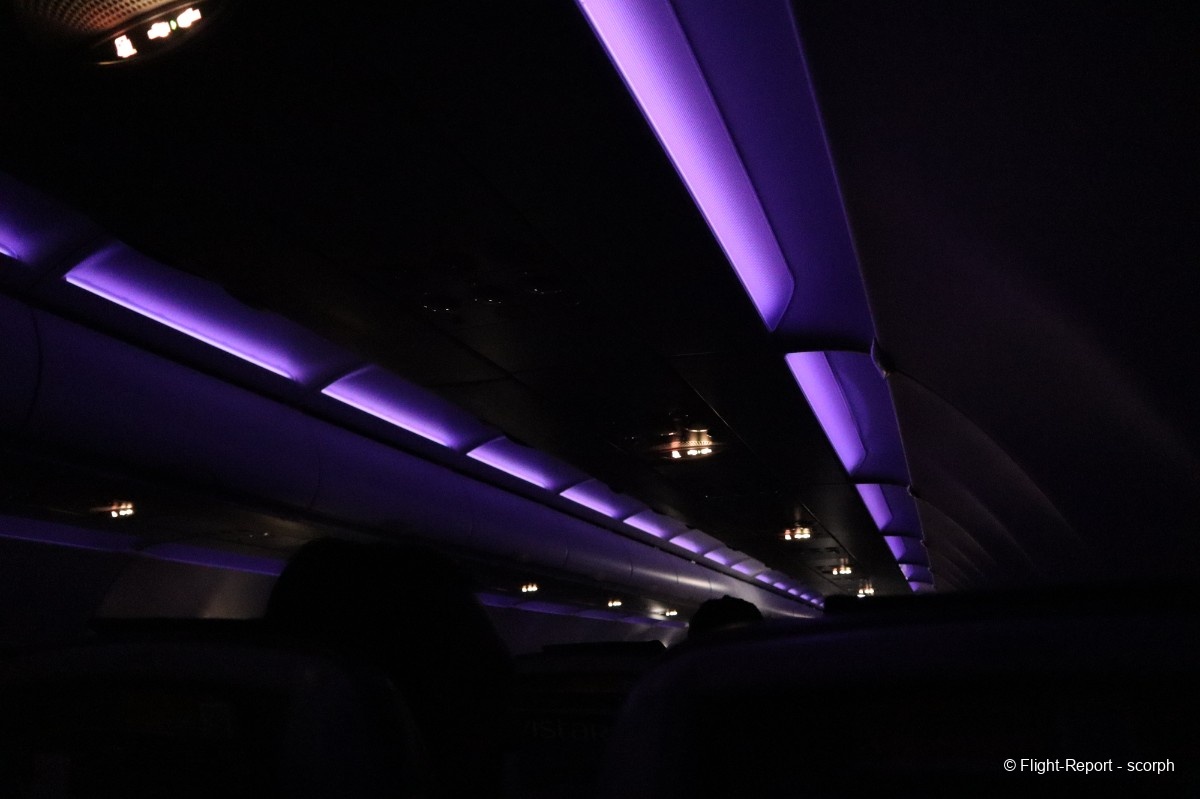
Service in the cabin starts quickly. I was expecting a sandwich box like on my previous flight to Hyderabad but not at all! Instead, a small hot meal tray is served on this flight, scheduled for one hour and twenty minutes but rarely exceeding 55 minutes of actual flying time. Needless to say, our crew will be kept busy serving and clearing a full cabin in barely 30 minutes.
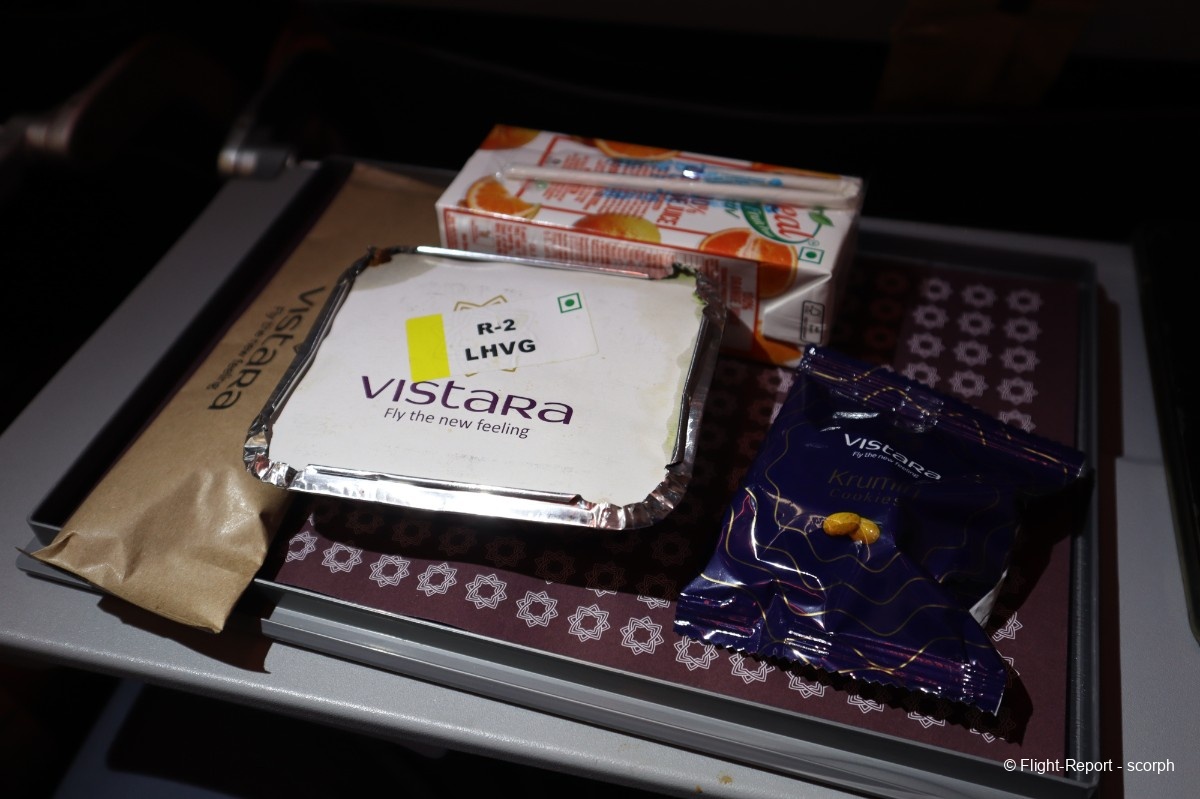
I wasn’t very hungry, but I still gave it a try. The rice was quite spicy, accompanied by a kind of palak paneer with corn. It was pretty good, though definitely tailored to the Indian taste. On the side, there were cumin biscuits, a small bottle of orange juice, and an additional bottle of water was offered to passengers who wanted it. Honestly, well done, Vistara!
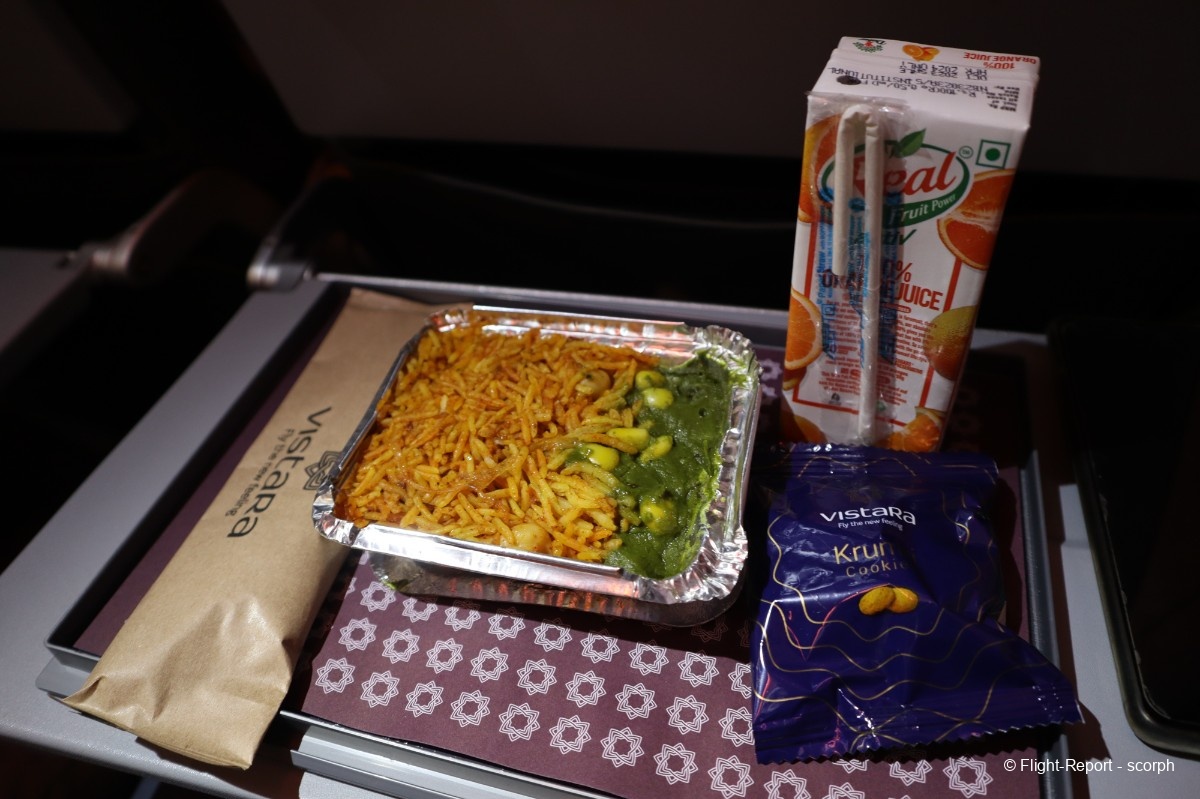
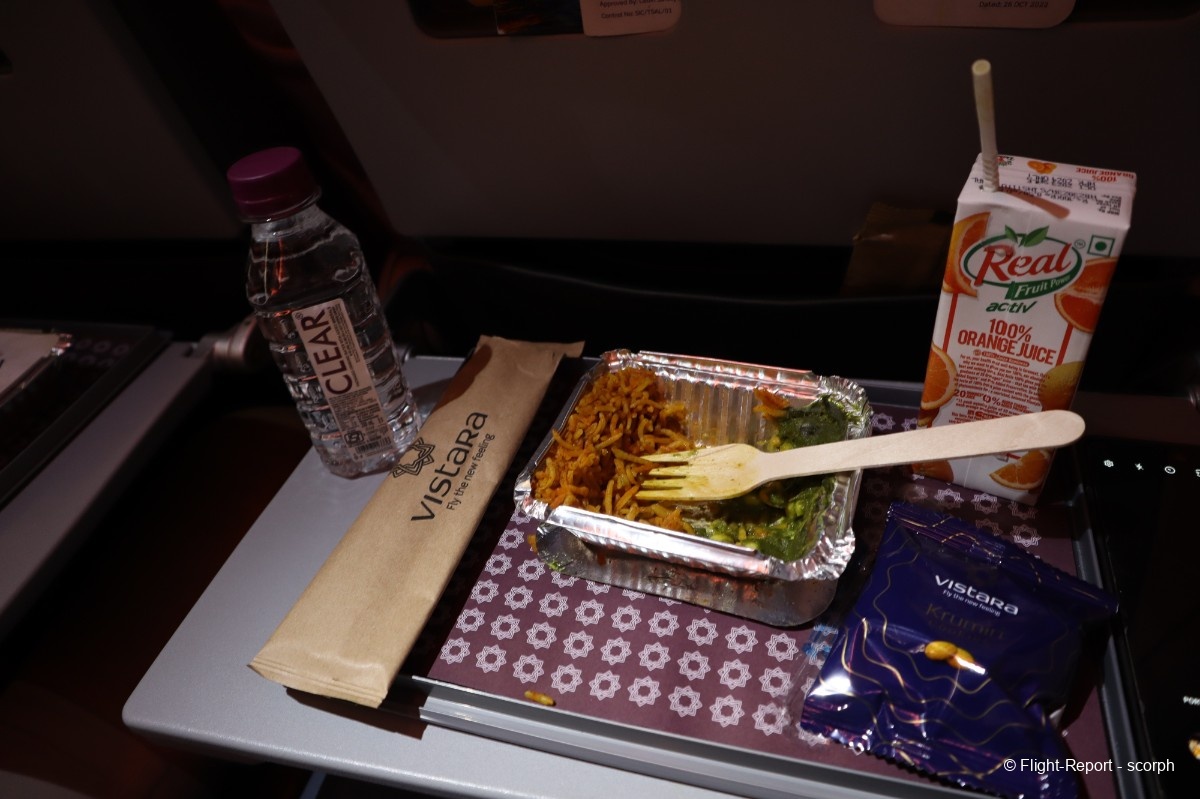
During the flight, the mood lighting shifts to orange.
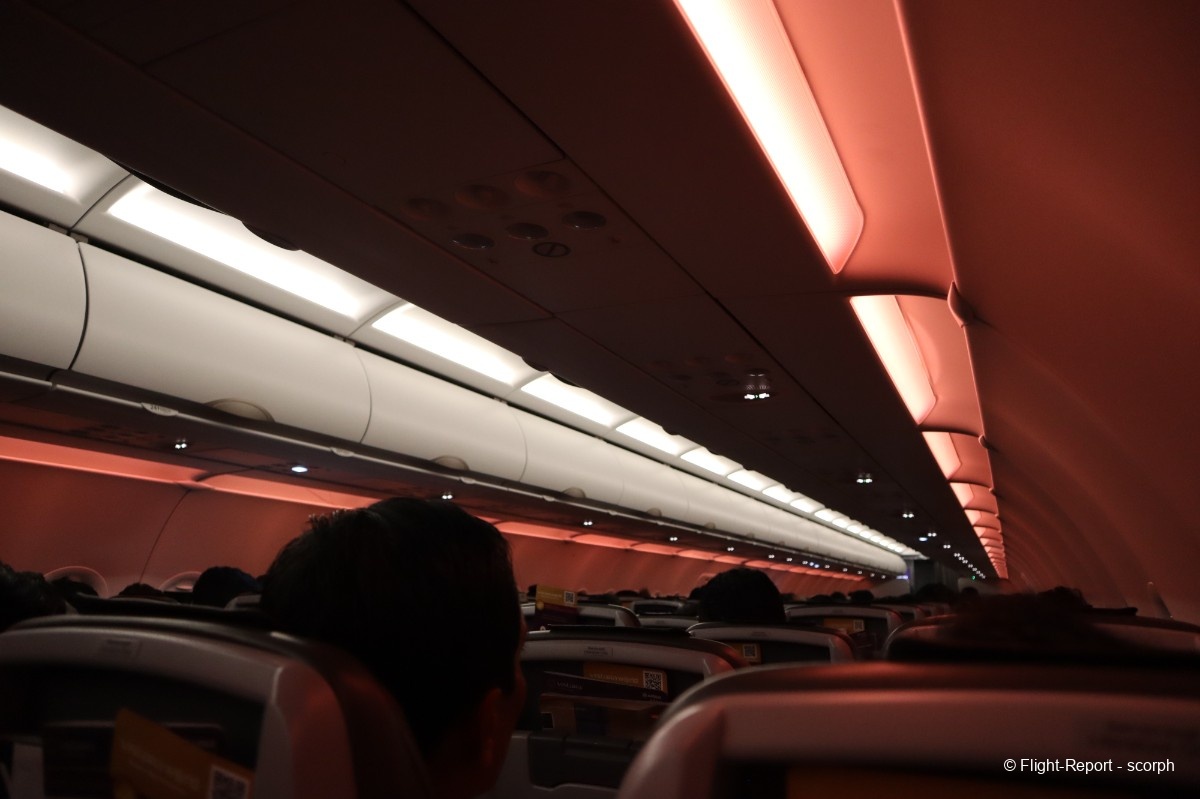
Details of the contents of the seat pocket: in addition to the mandatory safety card, there’s a brochure about the in-flight entertainment on the personal display, which I wasn’t able to connect to my smartphone. There’s also a nice in-flight magazine.
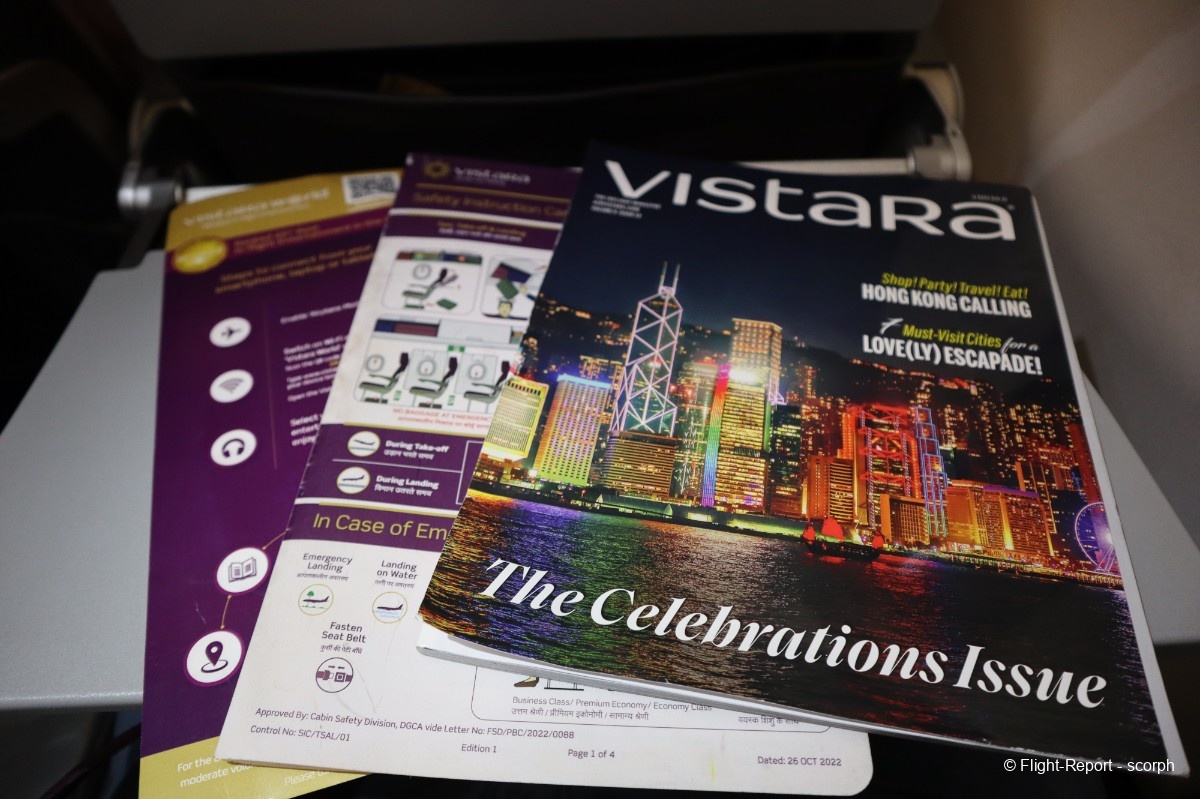
In which av-geeks and travel-geeks won’t be forgotten, with a nice presentation of the fleet as well as the airline’s network.
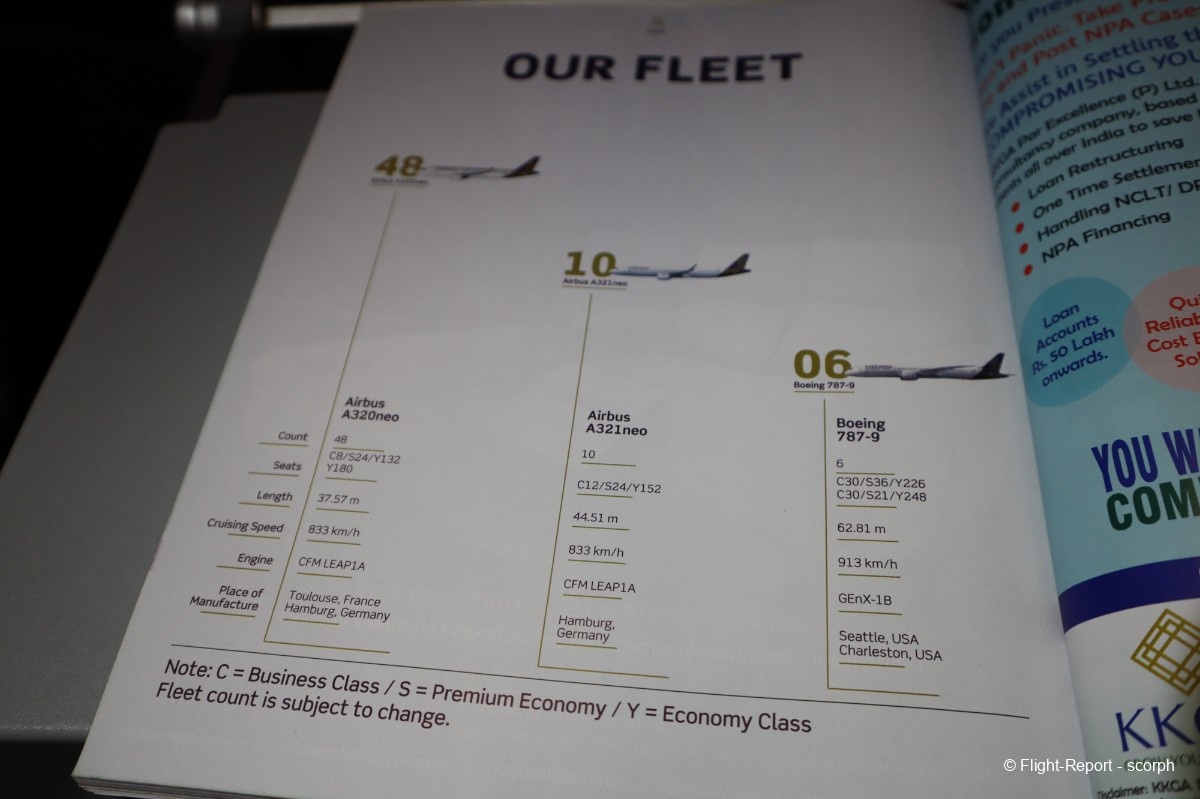
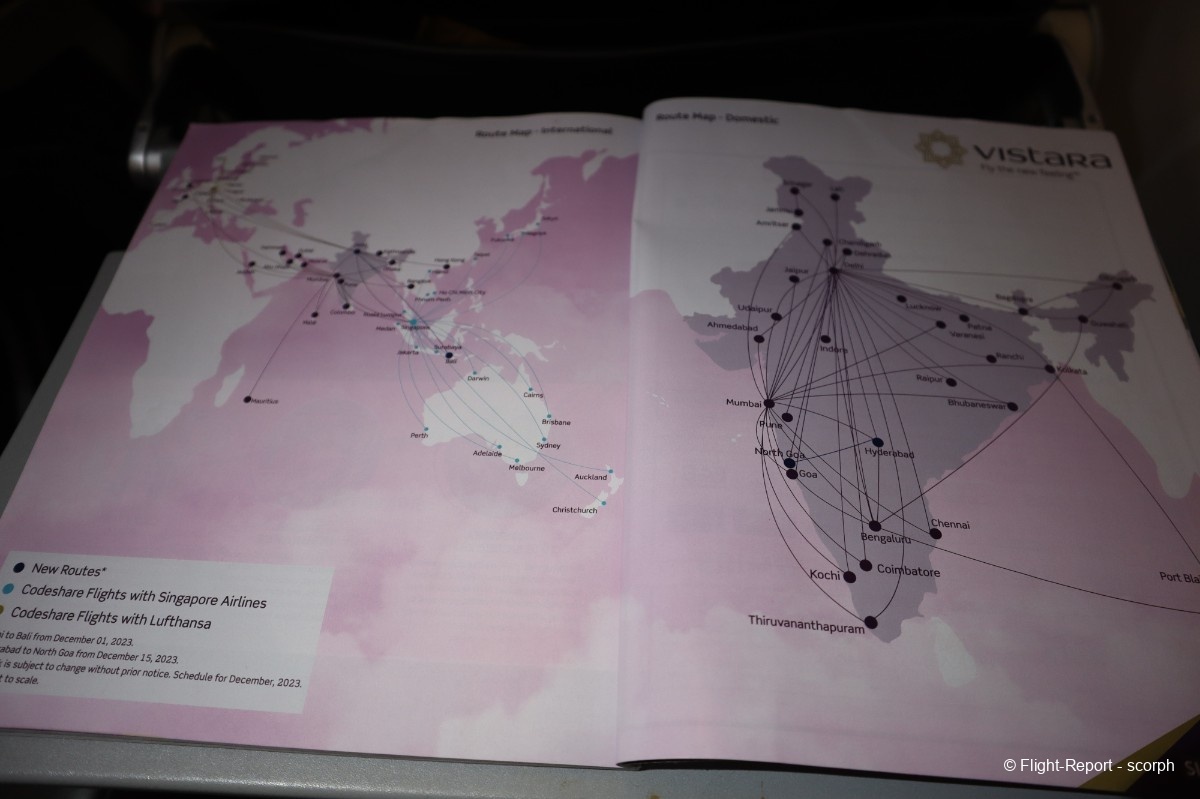
The route followed by our flight today, cruising at 30,000 feet.
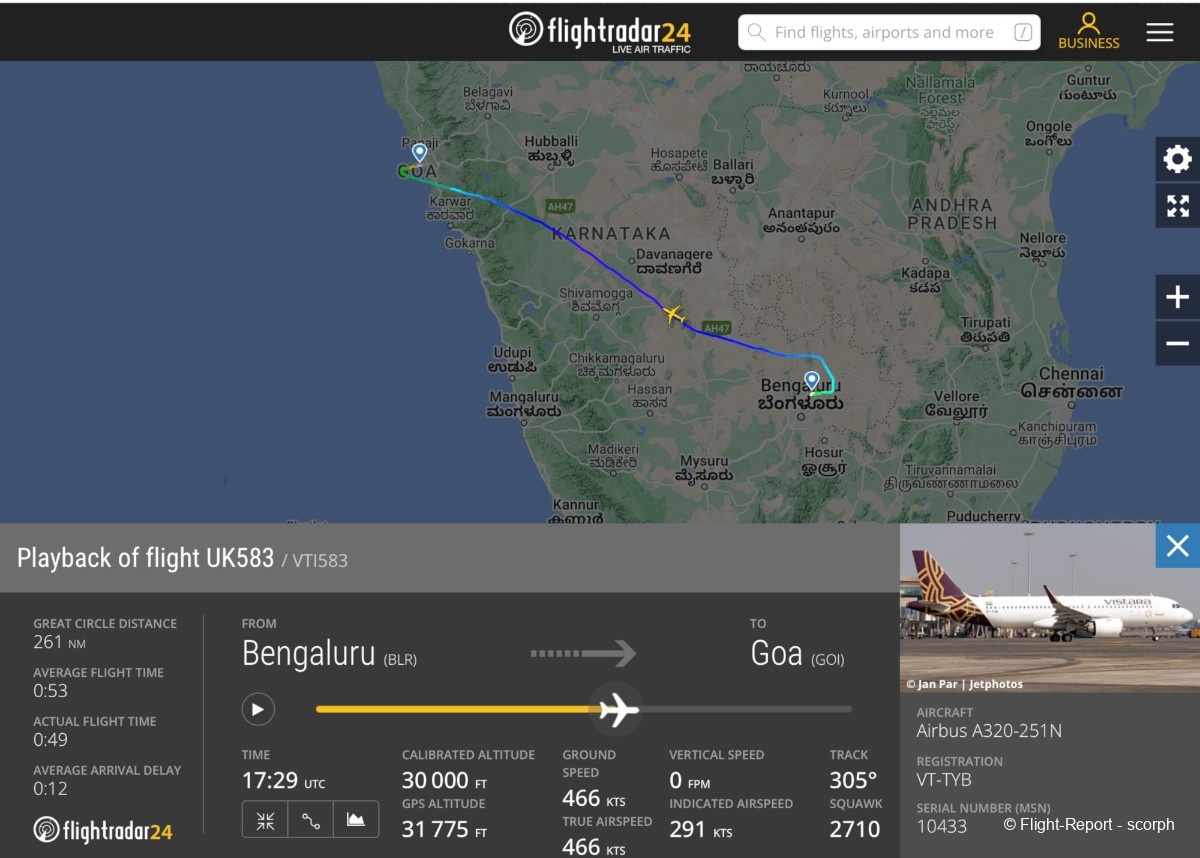
We quickly approach our destination; you can see the coastline in this photo. We will need to make a 180° turn over the Arabian Sea before approaching Dabolim from the west.
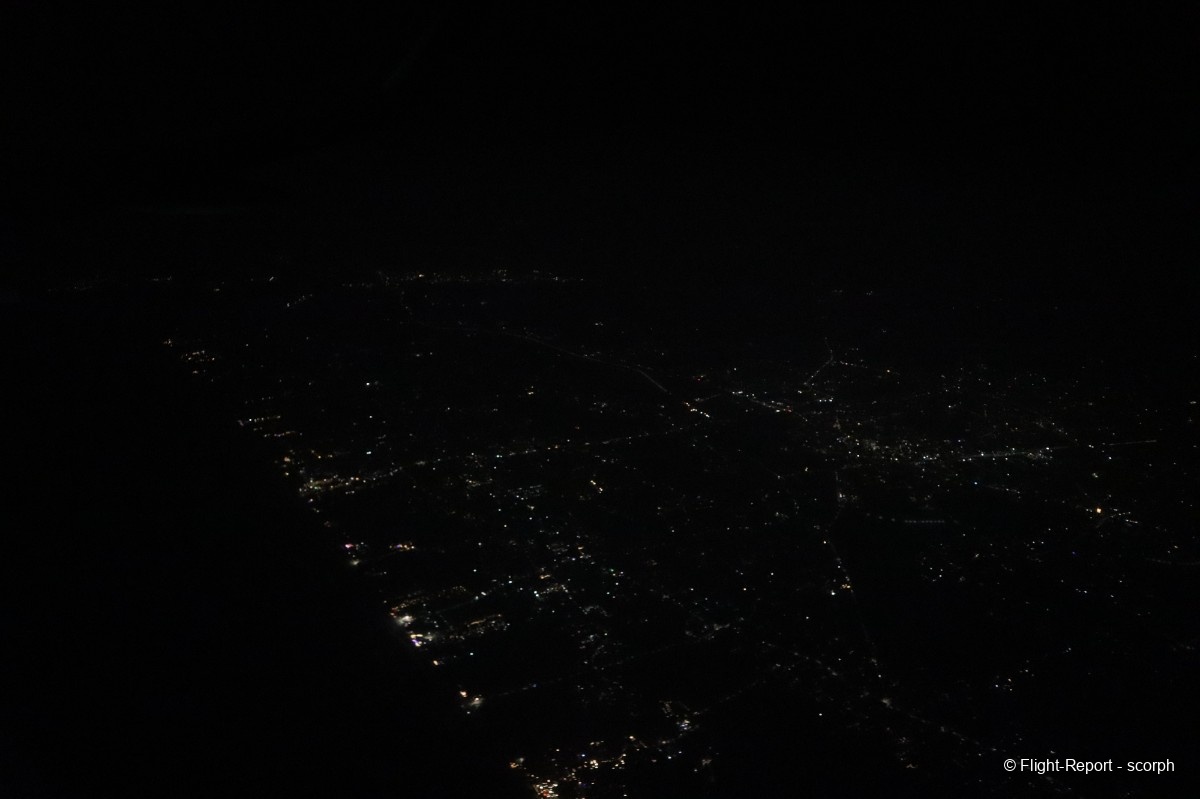
Just like during takeoff, the cabin lights are dimmed.
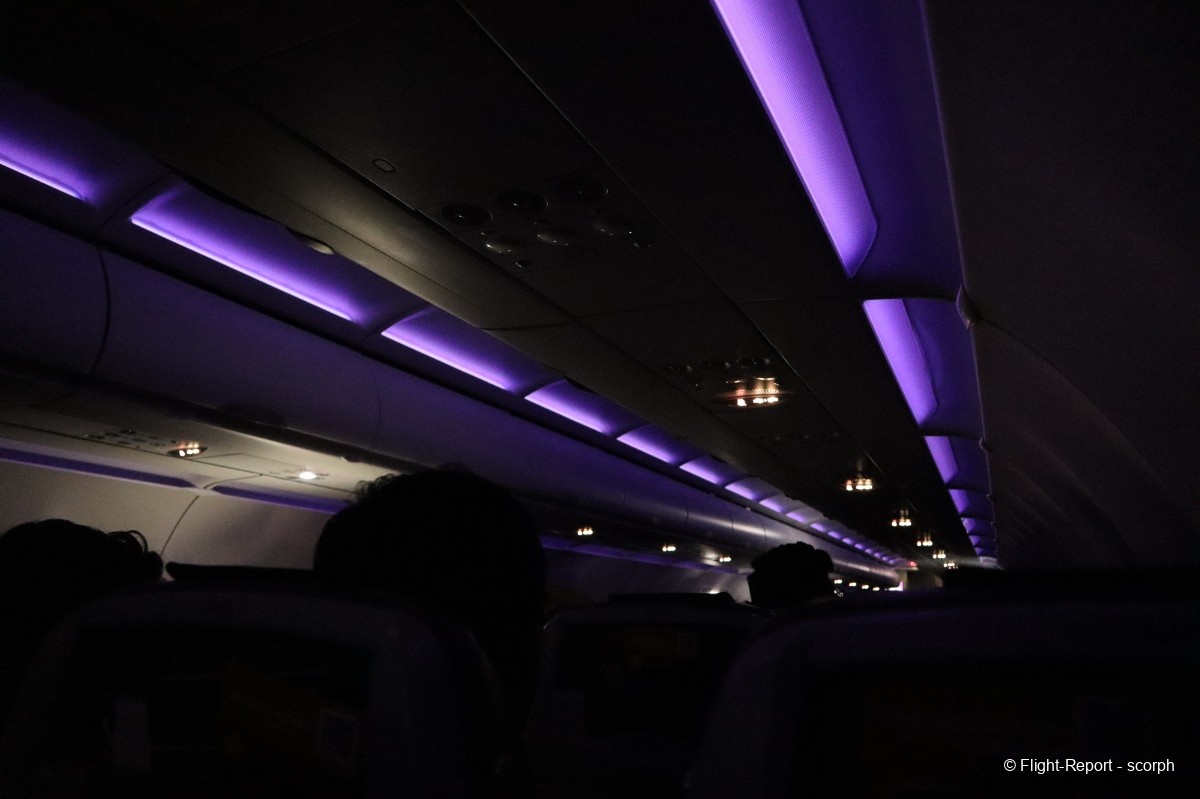
Night landing in Dabolim
And it will be a smooth and on-time landing on the tarmac of Goa Dabolim Airport. We quickly leave the runway and begin the short taxi to the terminal. While the northern part of the airfield is civilian, the southern part is a military base of the Indian Navy, which until recently housed the Tupolev 142 "Bear" anti-submarine warfare aircraft.
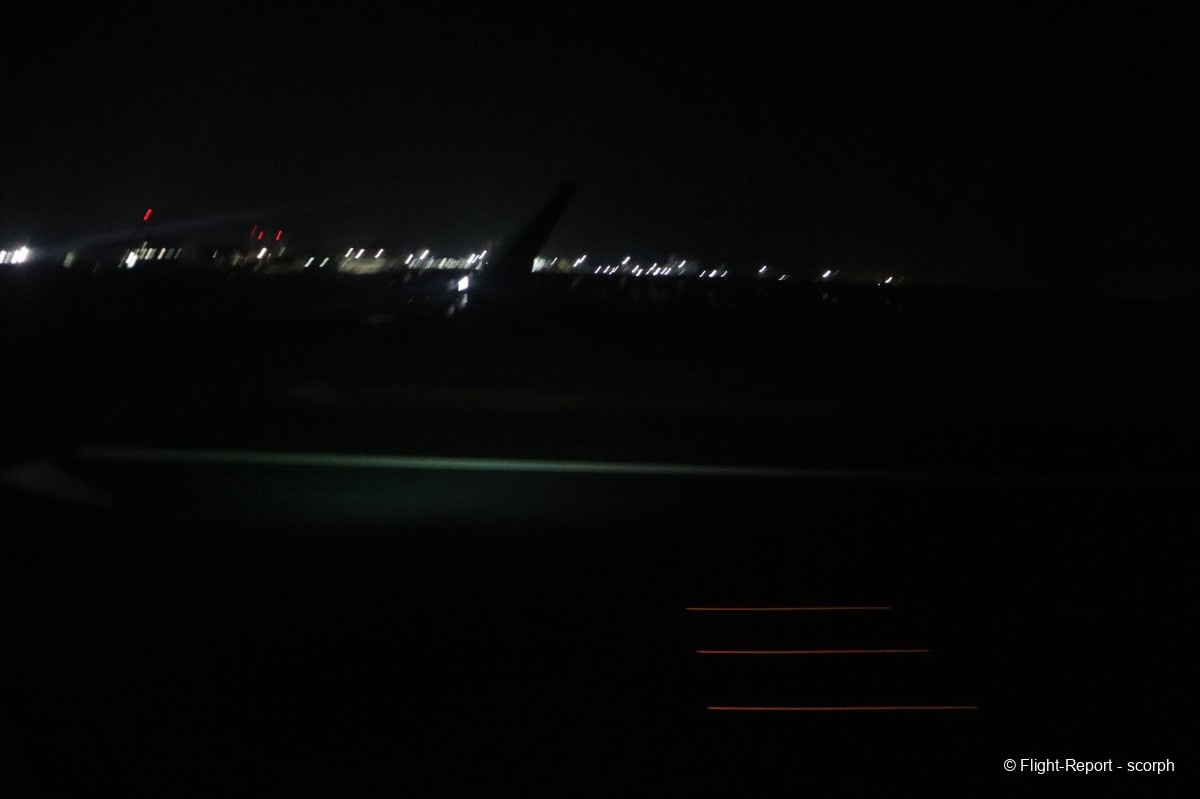
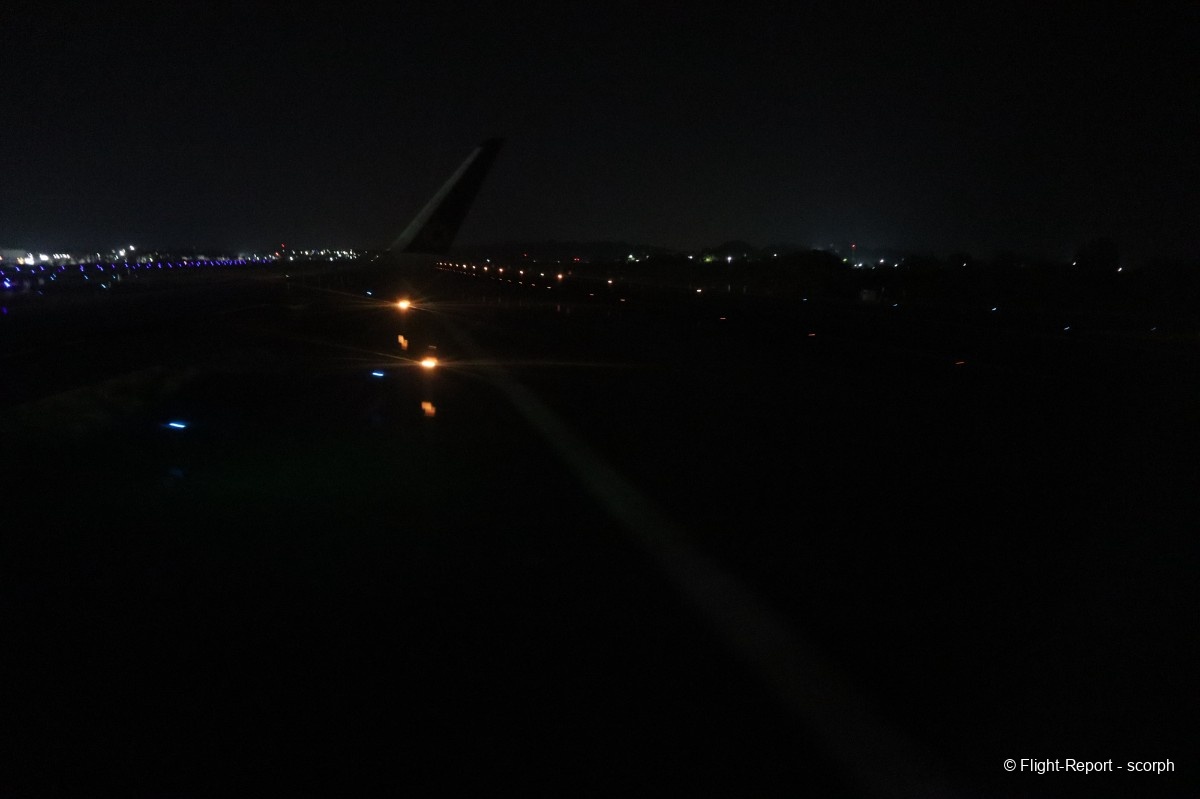
The terminal is modern on the outside. You can spot a few aircraft parked at the gates, likely handling domestic traffic. Nothing particularly exotic with an Airbus A320 of Air India Express and an Airbus A321neo of IndiGo.
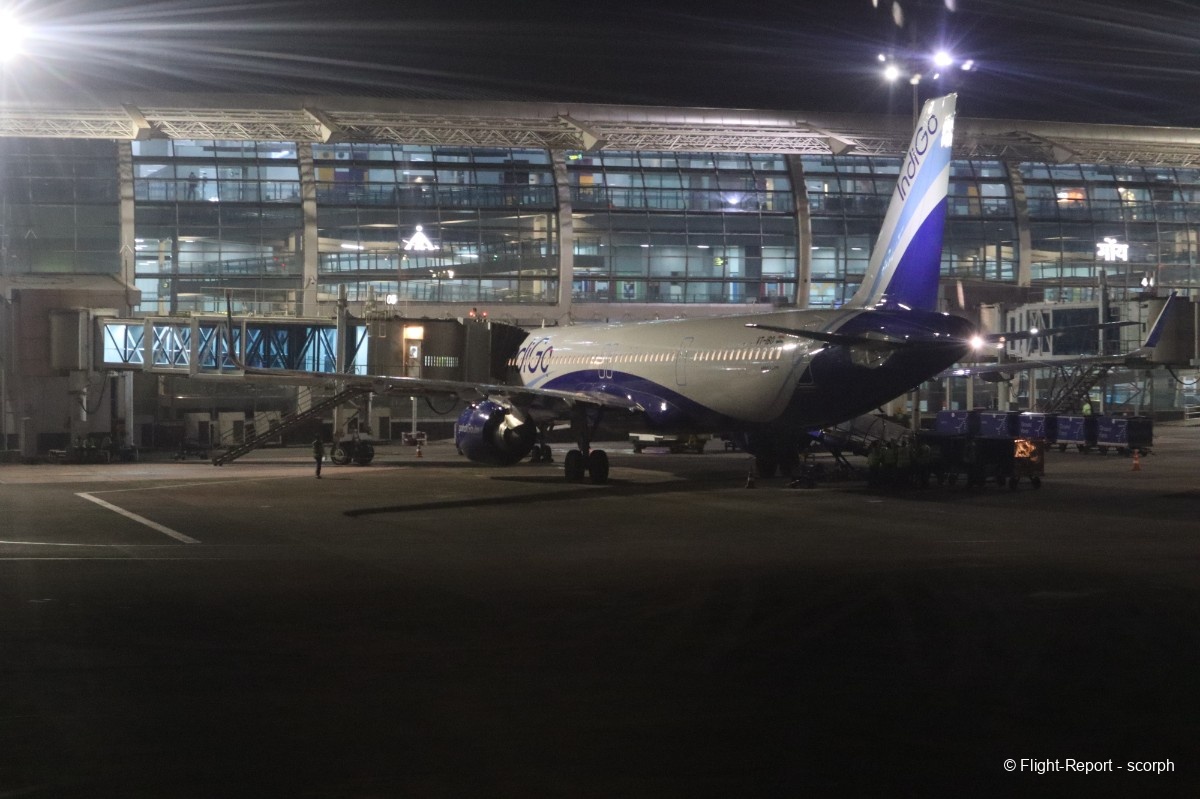
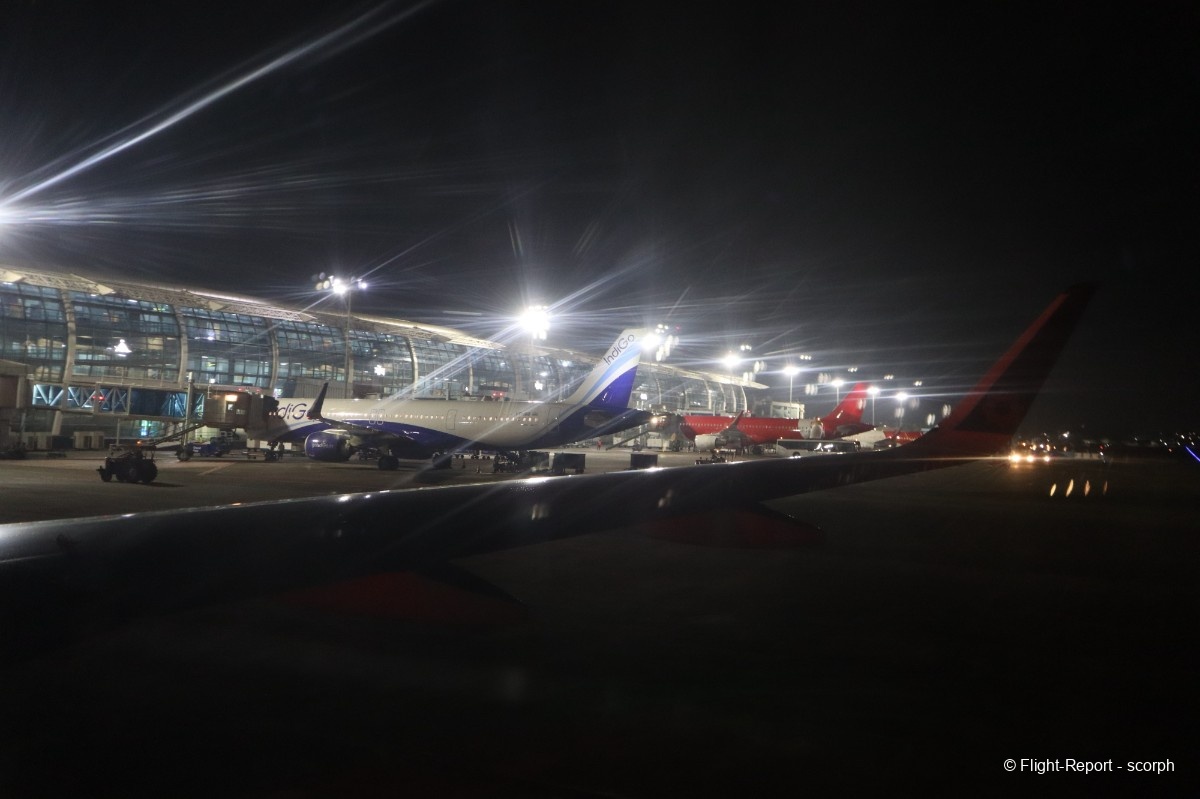
We will be parked on the side of the terminal. Disembarkation will begin quickly, using both the front and rear doors.
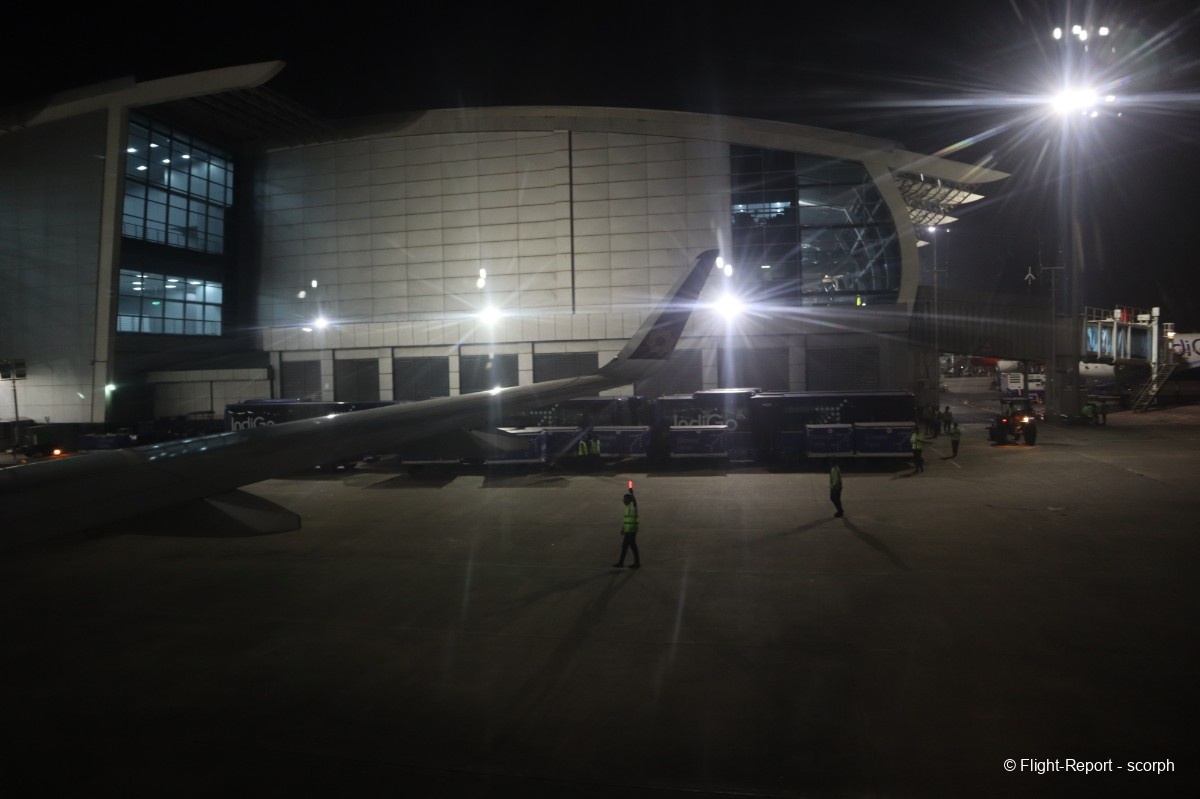
I’ll exit through the rear door a small mistake, since I’ll have to take a ride on the passenger bus. Along the way, a ground agent advises me to hide my camera to avoid any trouble with the local authorities. Given that the airfield is also a military base, I can understand this request.
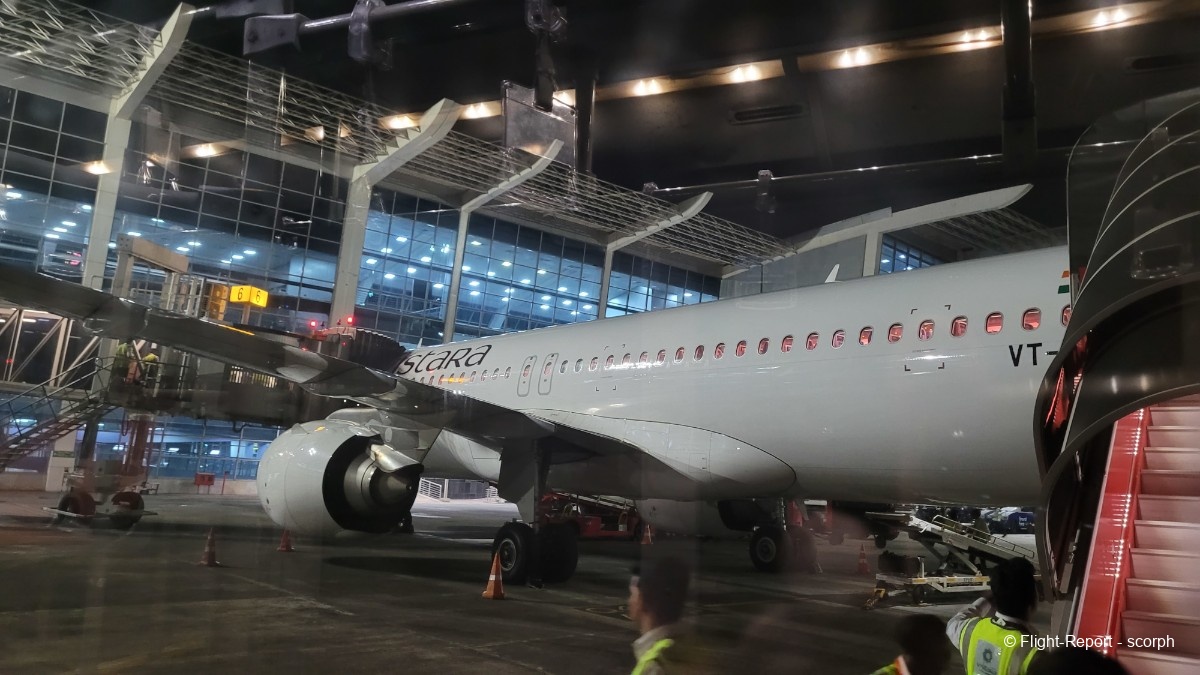
Here is the distance traveled by the passenger bus, which, let’s be honest, couldn’t have exceeded 50 meters. This gave me the chance to take one last, rather successful photo of my evening A320neo, which was preparing to return to Bangalore.
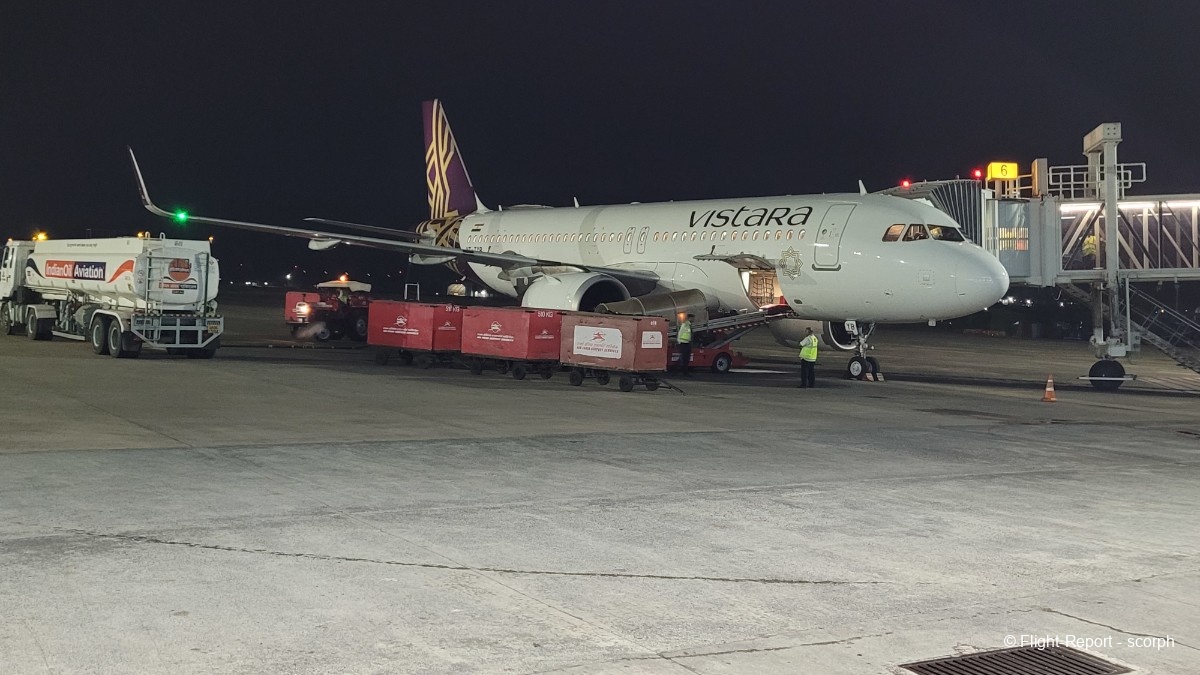
A short walk is necessary to reach the baggage claim area. I’m not sure if the passenger ahead of me was traveling with his badminton rackets. In any case, my colleague and I are traveling light, so we’ll be passing through this area without stopping.
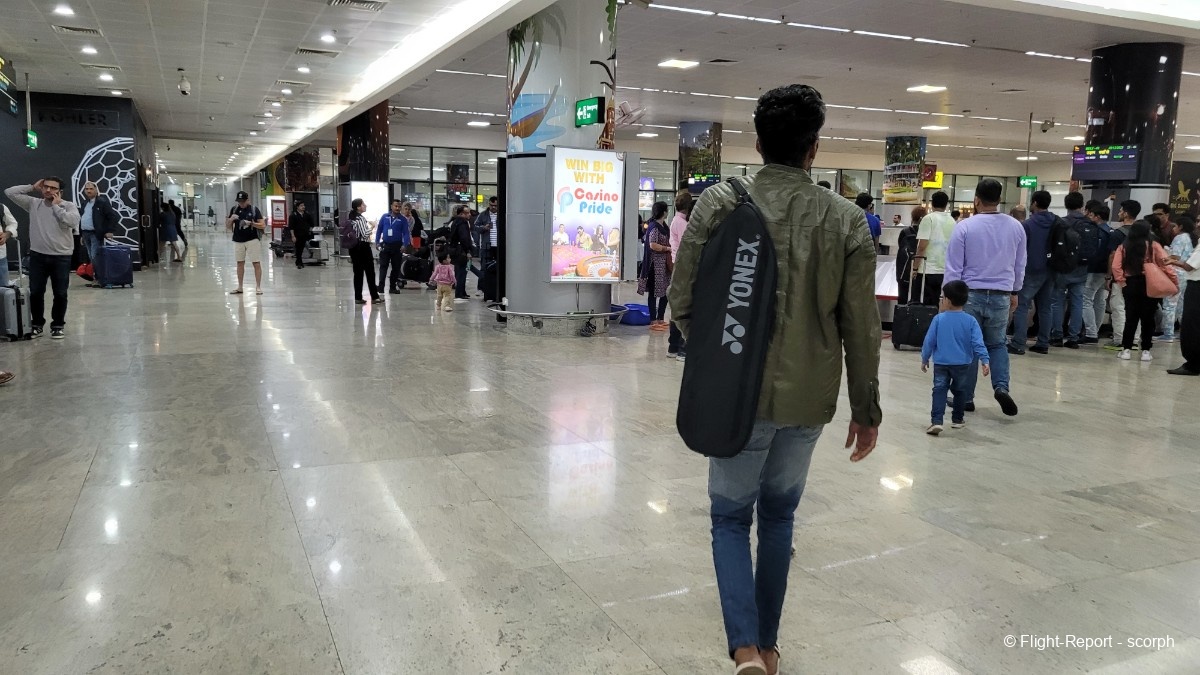
We quickly arrive in the narrow groundside area where you can find some transport services, but the tightness of the space is explained by the fact that the airport is built on a peninsula and land is scarce. If you’ve been following my reports, you’re probably starting to understand that the groundside area isn’t really all that useful this zone is reserved for ticketed passengers, and accompanying persons must stay outside. As a result, it usually feels somewhat deserted.
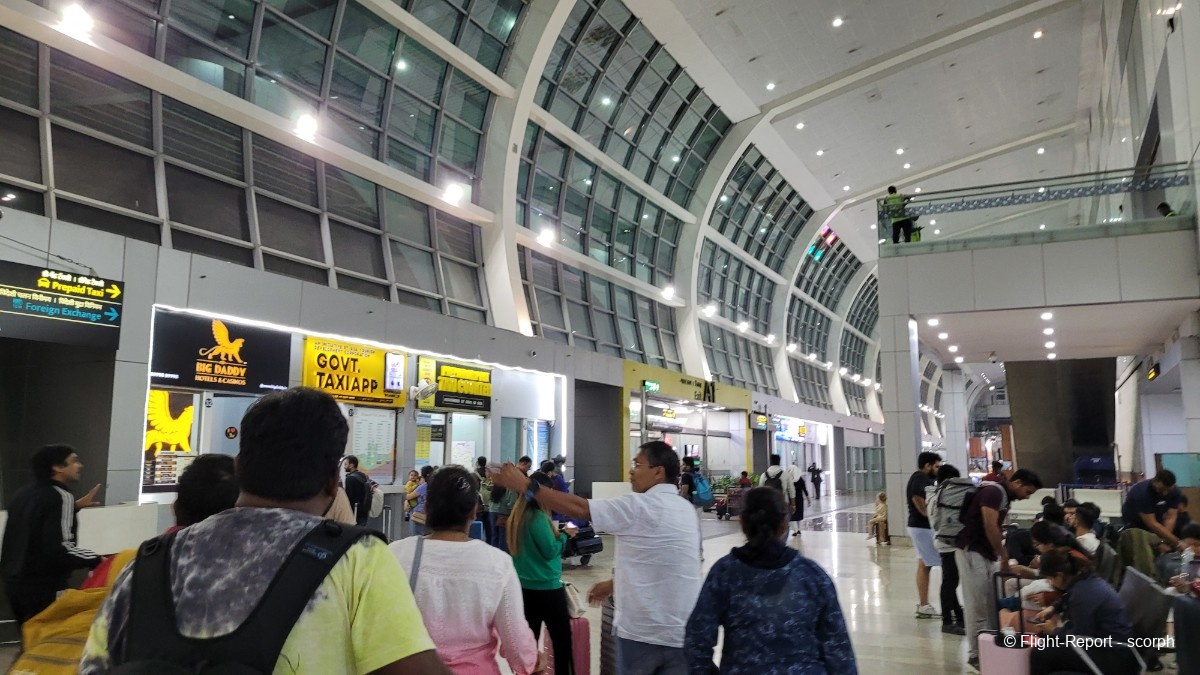
And for good reason—most of the services and activity are found under the outdoor canopies, which are common in most Indian airports. Currency exchange, prepaid taxis, car rentals, even food stalls everything is packed in near the roadside drop-off area.
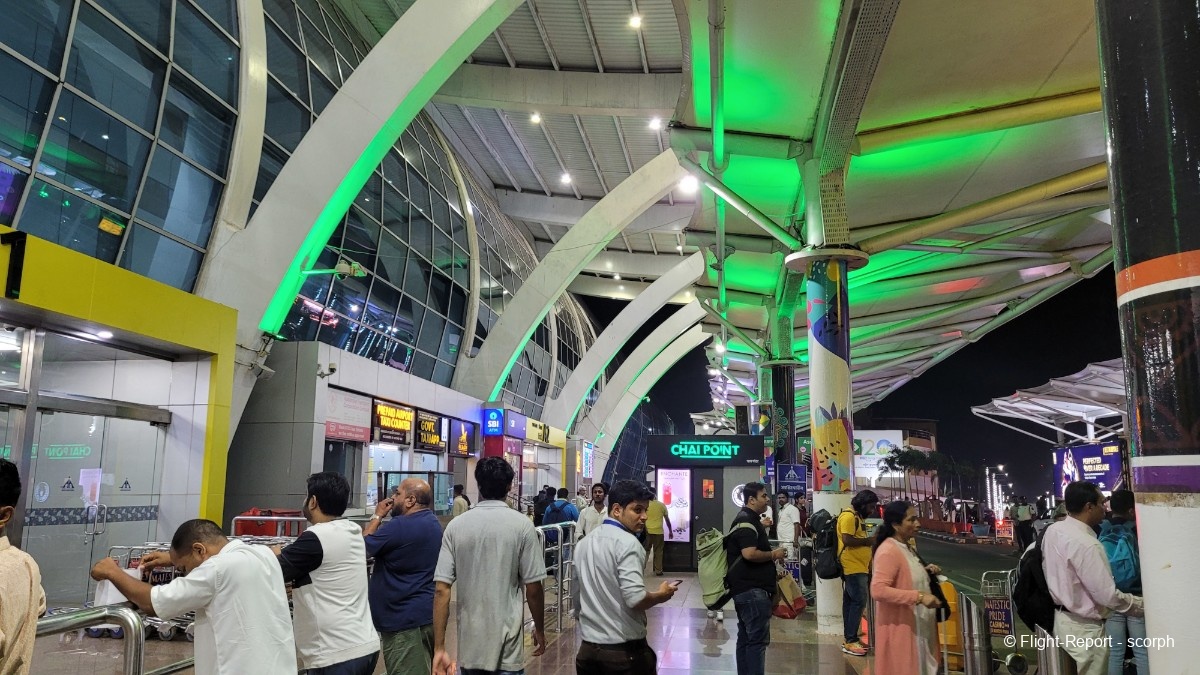
A quick WhatsApp call (during this trip I had a local SIM plan that worked perfectly and cost almost nothing) to join the driver of thé car from our hotel arrives to pick us up. We’re headed a bit over an hour south of the airport, to the shores of the Arabian Sea, near the small town of Agonda.
